The Evolution of Content Creation – How AI Optimization is Transforming Digital Marketing
You are entering a new era of content creation, where AI optimization dramatically reshapes digital marketing strategies. Understanding how this transformation affects your approach to content can lead to more engaging and effective marketing. AI tools streamline content generation, enhance SEO performance, and provide insights that allow you to connect more deeply with your audience. As the landscape evolves, it’s vital to stay informed about these changes. Lets dive into more insights on How AI Is Changing The Content Creation Process And … today!

Key Takeaways:
- AI Integration: The incorporation of AI into content creation streamlines and enhances the efficiency of digital marketing strategies.
- Personalization: AI allows for targeted content that resonates with specific audience segments, improving engagement rates.
- Data Analysis: AI optimizes content by analyzing consumer behavior and preferences, leading to more effective marketing campaigns.
- Natural Language Processing: Advances in NLP enable the production of human-like text, increasing the authenticity of automated content.
- Content Distribution: AI tools facilitate the strategic distribution of content across multiple platforms, maximizing reach and impact.
- Cost Efficiency: Automation through AI reduces the costs associated with manual content creation and management.
- Future Trends: As AI technology continues to evolve, its role in content marketing will expand, further influencing industry standards.
The Rise of Content Creation
Historical Background
Before the advent of digital marketing, content creation was largely confined to traditional media sources such as newspapers, magazines, and television. Writers, journalists, and advertisers were the primary architects of content, producing material that often occurred in long cycles. This meant that you relied heavily on the pace of conventional publishing and the willingness of various media outlets to provide space for your voice. With the arrival of the internet, however, the power of content creation transformed significantly, allowing individuals to become publishers in their own right.
Before the widespread use of social media and blogs, the content landscape was limited and less interactive. Your options for engaging with audiences often included submitting articles for consideration or arranging costly ad placements. The democratization of content creation began with platforms like WordPress and social networks like Facebook and Twitter. These platforms empowered you to share your thoughts, ideas, and stories instantly, shifting the focus from gatekeepers to the creators themselves.
The Role of Human Creativity
Above all, human creativity remains a key component in the evolution of content creation. While AI technology can analyze data and optimize for engagement, it cannot replicate the unique perspective that only you can provide. Your experiences, emotions, and insights fuel the creative process, enabling you to establish genuine connections with your audience. Creative storytelling and personal touch elevate your content, allowing it to resonate on a much deeper level.
Hence, even in a landscape increasingly dominated by AI-driven tools, your role as a creative thinker is irreplaceable. The essence of your unique voice and style breathes life into the content you produce, ultimately enhancing its impact. AI can assist in streamlining processes and minimizing mundane tasks, but the heart of content—your ingenuity and originality—remains important.
Changing Consumer Expectations
Rise of the digital age has ushered in a new era of consumer expectations. Modern audiences increasingly demand engaging, personalized content that speaks directly to their needs and interests. As a result, your content must not only inform but also entertain and resonate with your target demographics. This heightened expectation challenges you to not only produce high-quality, relevant material but also to innovate constantly to keep your audience intrigued.
Rise of technology has further amplified these expectations. Users are now accustomed to instant gratification, meaning that your ability to deliver timely, relevant content can make or break your digital marketing strategy. In this fast-paced environment, maintaining a proactive approach towards your audience’s needs and preferences is more important than ever for the success of your content.
Further, understanding that consumers are increasingly inclined toward authenticity means you, as a content creator, need to be transparent and relatable in your approach. This shift represents an opportunity for you to build trust and rapport with your audience, making your content more effective and your brand more enduring. By embracing these expectations, you set yourself up for long-term success in the dynamic world of digital marketing.
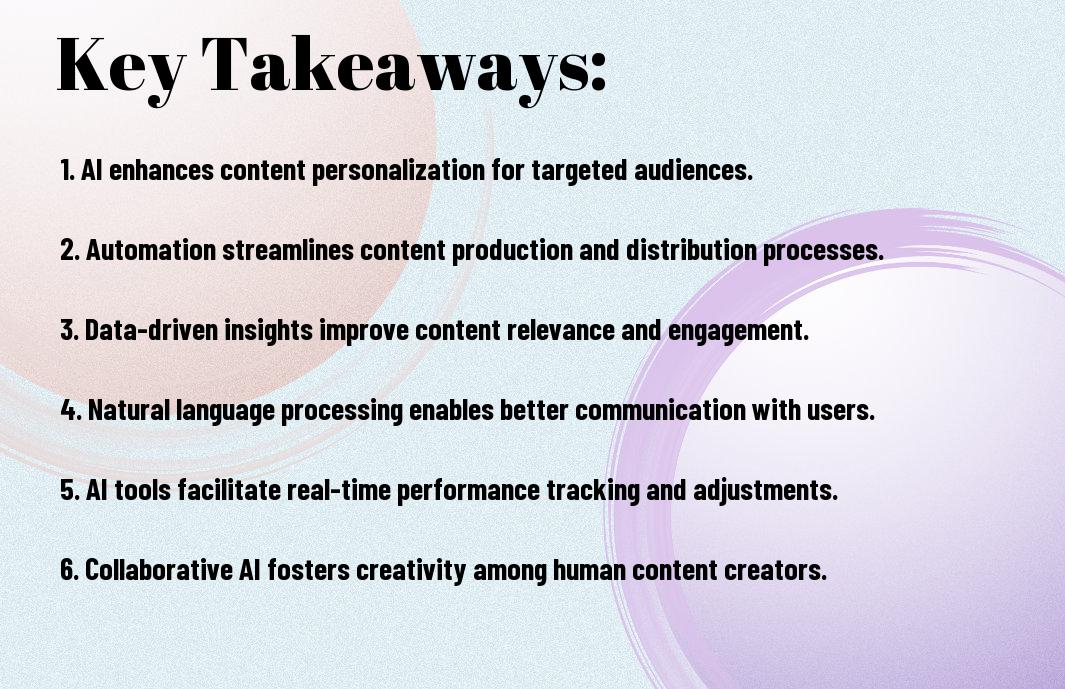
Understanding AI in Content Creation
Any conversation about the future of digital marketing inevitably leads to Artificial Intelligence (AI) and its growing influence on content creation. As more businesses look to optimize their strategies, understanding AI’s role becomes necessary for your success. AI is no longer a distant technology; it is here, working alongside you to enhance efficiency and creativity in your content initiatives.
Defining Artificial Intelligence
Between the various definitions, AI can best be understood as the simulation of human intelligence processes by machines, especially computer systems. This definition encompasses areas such as learning, reasoning, and self-correction, which play a pivotal role in how content is created, managed, and distributed in digital marketing.
AI technologies also involve machine learning, where algorithms analyze data to improve their performance autonomously. These processes allow marketers and content creators like you to focus on strategic decisions while giving AI the tools to handle repetitive and data-heavy tasks. Additionally, AI can understand user preferences, allowing for more personalized content delivery and enhancing user experience.
Types of AI Technologies Used in Content Creation
Around the spectrum of AI applications, several technologies stand out in content creation. Each technology provides unique advantages that can transform how you approach your marketing efforts. Here are some key types:
| Natural Language Processing (NLP) | Helps analyze and generate human language for content creation. |
| Machine Learning Algorithms | Automates data analysis for trend recognition and prediction. |
| Chatbots and Virtual Assistants | Engages with customers in real-time, driving content interaction. |
| Content Generation Tools | Creates content drafts and ideas using AI analytics. |
| Social Media Analytics | Evaluates user engagement to optimize content strategy. |
In fact, each of these technologies carries the potential to revolutionize your content creation process by reducing manual workload, providing insights, and offering personalization. Understanding how to leverage these resources effectively can lead to more impactful marketing campaigns.
- Natural Language Processing (NLP) – Integral for understanding context and sentiment.
- Machine Learning – Powerful in analyzing trends and consumer behaviors.
- Content Generation Tools – Help you brainstorm and draft content more efficiently.
- Chatbots – Facilitate seamless communication with your audience.
- Analytics Tools – Offer insights to fine-tune your strategy.
Recognizing that AI technologies can complement your creative efforts allows you to focus more on ideation and less on tedious tasks. As a result, you can channel your creative energy into innovative and compelling content that resonates with your audience.
How AI Enhances Creativity
Creation of content is often viewed as an art, but when combined with AI, it becomes a powerful blend of creativity and technology. By analyzing vast amounts of data, AI helps you identify trends, customer preferences, and emerging topics that are relevant to your audience. This ability frees you from guesswork and enables you to harness data-driven insights for more focused content strategies.
Moreover, AI-generated suggestions can serve as a springboard for your creative process, helping you brainstorm new ideas or even draft articles. With tools that provide writing prompts or enhance your storytelling abilities, you can explore different angles and formats, thus expanding the creative possibilities available to you. AI doesn’t just execute pre-defined tasks; it empowers you to push the boundaries of your creativity.
Creativity is well complemented when you embrace AI in content creation. The positive influence AI has on your creative process lies in its ability to offer data-driven insights while automating repetitive tasks. This synergy enables you to focus on innovative ideas rather than burdening yourself with administrative duties. However, overreliance on AI can lead to a diluted creative voice, so maintaining a balance between human intuition and AI-driven suggestions is necessary.
The Transformation of Digital Marketing
Now, it’s important to recognize how rapidly the landscape of digital marketing has evolved. As technology has advanced, so have the methods and strategies employed by marketers. The shift from conventional marketing tactics, such as print advertisements and television commercials, to a more integrated digital approach has profoundly impacted the way you engage with your audience. With the rise of the internet and mobile devices, traditional marketing methods have become less effective, compelling businesses to explore new avenues that allow them to connect with their customers on a more personal level.
The Shift from Traditional to Digital Marketing
For many years, businesses relied heavily on traditional marketing methods to promote their products and services. However, as consumer behavior changed, so did the channels through which you reach your target audience. Digital marketing encompasses a wide array of strategies, including social media marketing, search engine optimization (SEO), and email marketing. These strategies enable you to engage with your audience in real-time, allowing for instant feedback and interaction.
Transitioning to digital marketing means that you can effectively track the performance of your campaigns, analyze metrics, and adjust your strategies accordingly. You can leverage tools and platforms that give insight into customer preferences and behaviors, facilitating a more tailored approach to your marketing efforts. This shift not only broadens your reach but also enhances your ability to produce targeted and relevant content that meets the specific needs of your audience.
AI’s Role in Personalizing User Experience
Above all, artificial intelligence (AI) has emerged as a pivotal force in transforming digital marketing by enabling businesses to create highly personalized experiences for their users. You can now analyze vast amounts of data to better understand your audience’s preferences and behavior patterns. This leads to more informed decisions regarding content creation, product recommendations, and targeted advertising, ensuring that your marketing messages resonate with the right people.
Shift your focus towards utilizing AI tools that not only enhance your content but also tailor it to your audience’s needs. AI algorithms can analyze user interactions and feedback in real-time, allowing you to refine your strategies effectively. By personalizing your messaging, you can build stronger connections with your audience, fostering loyalty and driving conversions.
Data-Driven Decision Making in Marketing
Among the many advantages of modern digital marketing is the emphasis on data-driven decision making. You can go beyond gut feelings and rely on measurable outcomes to inform your marketing strategies. The availability of analytics tools provides you with valuable insights into customer interactions, engagement rates, and conversion statistics, ensuring that your campaigns are as effective as possible.
This data-centric approach not only enhances your ability to gauge the effectiveness of your strategies but also helps you identify trends and opportunities that can inform future projects. By closely analyzing these metrics, you can allocate your resources more effectively, maximizing your return on investment and minimizing waste in your marketing initiatives.
It’s imperative to embrace data-driven strategies as they empower you to respond swiftly to market changes and continuously optimize your approach. By integrating AI into your data analysis processes, you’ll be equipped to make predictions and craft campaigns that resonate with your audience, further enhancing the impact of your marketing efforts.

AI Optimization Techniques in Content Creation
Unlike traditional content creation methods that often rely heavily on human input, AI optimization techniques are revolutionizing the way you develop and distribute content. These advanced technologies not only enhance productivity but also improve the quality and relevance of the material being produced. As you embrace AI in your content strategy, you’ll find that the combination of data-driven insights and machine learning can lead to more targeted and engaging pieces that resonate with your audience.
Content Generation Tools
Any digital marketer today can harness the power of content generation tools powered by AI. These tools can create articles, social media posts, and even entire blogs with minimal human oversight. By analyzing vast amounts of data and user behavior, these systems can generate content that is not only relevant but also tailored to current trends and audience preferences. This means that you can save time on writing and focus on refining your overall strategy while still maintaining a strong online presence.
Additionally, the implementation of natural language processing (NLP) allows AI systems to produce content that sounds human-like, making it easier for your audience to engage with. The integration of these tools into your workflow can result in a significant uplift in content marketing effectiveness while providing you with more data and insights to optimize future campaigns.
SEO Optimization through AI
For many marketers, search engine optimization (SEO) is a top priority, and AI optimization plays a vital role in enhancing your SEO strategies. With AI, you can analyze search trends and keywords in real-time, enabling your content to rank higher in search results. AI tools can provide recommendations for keywords along with analysis on competitive rankings, allowing you to tailor your content precisely to what your audience is searching for. By leveraging these tools, you ensure that your content reaches the right users at the right time.
The use of AI-driven algorithms allows you to monitor how your content performs over time. You can gain insights into bounce rates, click-through rates, and user engagement to make informed decisions on how to adjust your content strategy moving forward. This data-driven approach minimizes guesswork and empowers you to create content that not only attracts but also retains your audience.
Tailoring Content for Target Audiences
Optimization of your content for specific audiences is another area where AI excels. Through behavioral analytics and demographic data, AI tools enable you to create customized content that speaks directly to your target market. By segmenting your audience based on preferences and behaviors, you can develop materials that align more closely with their interests and needs. This personalized approach contributes to higher engagement rates and customer loyalty.
To ensure that your content resonates with your target audience, consider utilizing AI to monitor audience feedback and engagement patterns over time. This feedback loop can guide your content creation and help you adapt your messaging to better align with audience desires, resulting in more impactful and effective marketing campaigns.
The Benefits of AI in Digital Marketing
Your approach to digital marketing is about to undergo a significant transformation, thanks to the integration of artificial intelligence. The benefits of AI are becoming increasingly evident, streamlining your marketing processes and providing a competitive edge in an ever-evolving landscape. For a deeper look into the impact of AI on content creation, check out The Evolution of Content Creation: How AI is Transforming ….
Increased Efficiency and Productivity
Around the globe, businesses leveraging AI technologies are experiencing remarkable increases in efficiency. By automating repetitive tasks such as data entry, social media posting, and even content creation, you’re freeing up your team to focus on strategy and creativity. AI tools can analyze performance metrics in real-time, allowing for swift adjustments to your campaigns, ultimately enhancing productivity and leading to faster results.
Moreover, AI’s ability to personalize content ensures that your messaging resonates with target audiences. By analyzing user behavior and preferences, AI systems can help you tailor your campaigns to maximize engagement, which means you’re delivering relevant content to the right people at the right time. This level of customization drives efficiency and ensures a more effective use of your resources.
Enhanced Data Analysis Capabilities
Among the many advantages AI brings, one of the most noteworthy is its enhanced data analysis capabilities. As a digital marketer, you know that data is a powerful resource, but processing and interpreting large volumes of data can be overwhelming. AI simplifies this by automating data collection and providing insights that are both actionable and timely. This not only aids in strategy formation but also enhances your ability to make data-driven decisions.
Efficiency in data analysis allows for real-time tracking of your marketing campaigns, making it easier to identify what works and what doesn’t. This can lead to more agile marketing strategies, where you adapt and pivot based on insights gleaned from customer behavior, ensuring that your offerings are always in line with market demand.
Improved Engagement and Reach
Between your audience’s growing expectations and the expanding digital landscape, capturing their attention is increasingly challenging. AI-driven tools can help you craft more engaging content by analyzing trends and user interactions. By understanding what resonates with your target demographic, you can enhance your messaging and delivery, leading to improved engagement and a broader reach.
Moreover, AI can facilitate personalized communication through smart segmentation and targeted advertising, which allows you to connect with your audience on a more personal level. This not only increases the chances of engagement but also fosters loyalty, as customers feel valued and understood.
Marketing with AI doesn’t just improve your effectiveness; it can also lead to a substantial increase in your customer base. By leveraging AI to optimize your digital strategies, you can reach audiences that might have previously been out of your grasp, ensuring that your brand continues to thrive in a competitive marketplace.
Challenges and Ethical Considerations
Keep in mind that while AI optimization offers exciting advantages in digital marketing, you must confront several challenges and ethical considerations. The rapid integration of AI tools into content creation and marketing strategies raises questions about creativity, privacy, and the balance between human oversight and automation. As you navigate this evolving landscape, staying informed about potential pitfalls is important to maintaining integrity and effectiveness in your marketing efforts.
The Over-reliance on AI
Against the backdrop of AI’s capabilities, one significant concern is the over-reliance on AI. While AI algorithms can enhance efficiency and streamline processes, they may inadvertently stifle genuine creativity. The natural intuition and emotional intelligence that human creators bring to their work cannot be fully replicated by machines. When you lean too heavily on AI for content generation, you risk producing material that feels impersonal and lacks the nuance required to resonate with your audience.
Moreover, an excessive dependency on AI tools can lead to homogenization in content, creating an oversaturated market of similar ideas and narratives. To stand out, you must find a way to blend AI capabilities with your unique voice and storytelling style, ensuring that your marketing efforts reflect both innovation and authenticity.
The Balance of Human and Machine Creativity
Below the surface of any successful digital marketing strategy lies a delicate balance of human and machine creativity. While AI can optimize processes and deliver valuable insights, it is important to maintain your unique perspective and emotional connectivity with your audience. Integrating human intuition with AI’s powerful data analysis capabilities can result in more effective marketing campaigns that truly resonate with your target demographic.
Human creativity brings the art of storytelling and personal engagement that is often lacking in AI-generated content. Marketers must not overly depend on AI for their entire content creation process; instead, blend AI-generated insights with your original thoughts and experiences. This synthesis allows for a richer, more authentic connection with your audience, helping you convey messages that reflect your brand values while effectively leveraging AI tools for optimization.
Privacy Concerns in Data Utilization
One of the most pressing challenges in the age of AI is the privacy concerns in data utilization. As AI systems analyze vast amounts of data to generate insights and optimize marketing strategies, the risk of compromising user privacy becomes a significant issue. Consumers are becoming increasingly aware of how their personal information is being used, leading to heightened concerns about data security and consent. To build trust with your audience, you must prioritize transparency around your data practices and ensure compliance with relevant regulations.
With ethical marketing practices, you can create a trustworthy relationship with your audience. Implementing robust data protection measures, obtaining explicit consent, and being transparent about how you utilize consumer data will empower you to minimize potential privacy risks. Respecting user privacy not only aligns with ethical standards but also enhances your brand’s reputation and fosters long-term customer loyalty.
Balance is the key when addressing privacy concerns; you can harness the power of AI while effectively safeguarding user data. By prioritizing ethical considerations in your data practices, you will not only comply with regulations but also position your brand as a responsible entity in an increasingly AI-driven digital landscape.
For further insights on AI’s influence on marketing trends, check out the article on How AI is Transforming Digital Marketing in 2024: Trends, Tools, and Tactics for Success.

Future Trends in Content Creation and Marketing
All signs point to a future where content creation and digital marketing will become increasingly integrated with advanced technology. As marketers and creators like you embrace emerging technologies, the landscape of digital content will undergo significant transformations. For instance, tools employing machine learning algorithms will enable you to analyze customer behavior more accurately, leading to more personalized content strategies. The raised expectations for quality engagement also mean that you will need to stay ahead of trends and leverage innovations to captivate your audience.
Emerging Technologies and Their Implications
Before diving deeper, it’s crucial to consider how emerging technologies will reshape the content creation process. Technologies like augmented reality (AR) and virtual reality (VR) are already offering more immersive experiences, allowing you to engage your audience in ways that conventional content simply cannot. As access to affordable AR and VR tools becomes more widespread, you can create rich storytelling experiences that foster deeper connections with your consumers. Additionally, the integration of AI in generating visual content, such as graphics and video, will assist you in saving time while improving your output quality.
Predictions for the Next Decade
Future outlooks suggest a marked shift towards hyper-personalization in your content marketing efforts. As AI systems become more adept at understanding individual consumer preferences, you will find that the demand for tailored content will increase. Moreover, platforms will evolve to host more interactive content formats, which will require you to rethink your approach and strategies. This will inevitably lead to more strategies focused on user-generated content, allowing you to draw on authentic voice and community engagement.
Marketing experts forecast that the next decade will see an exponential rise in cross-channel marketing strategies. You will need to adapt digital campaigns in real-time, pivoting between various platforms based on data insights, which AI optimization provides. As tools evolve, your ability to accurately predict trends and craft strategies will be enhanced, thus fostering a more loyal and engaged audience.
Preparing for a Hybrid Creative Environment
After exploring the technological advancements, it’s time to focus on how you can prepare for a hybrid creative environment. The current paradigm emphasizes the blending of human creativity with AI-driven optimization. You can enhance your productivity and creativity by embracing collaboration across various departments and disciplines. Utilizing AI tools for tasks like data analysis and content curation allows you to free up time, enabling you to devote more energy to ideation and creativity.
Decade-long shifts in your work environment will increasingly require you to adapt tools and processes to promote a more collaborative atmosphere. Think of the hybrid environment as an opportunity to embrace innovative approaches to content creation. By integrating AI tools into your processes and valuing diverse input from various team members, you can maximize the potential of your content strategies, ensuring that you’re well-positioned for the complexities of the future.
Summing up
Conclusively, you are witnessing a transformative phase in digital marketing where AI optimization is reshaping the landscape of content creation. As you leverage advanced algorithms and data analytics, you can enhance your marketing strategies to generate more engaging and personalized content. This not only improves the user experience but also increases conversion rates, making your campaigns more effective. By embracing AI tools, you can efficiently optimize your content, allowing you to focus on creativity while technology handles the metrics.
Moreover, as you navigate this evolution, it becomes increasingly important to adapt your skills and knowledge to keep pace with ongoing advancements. Utilizing AI-driven insights enables you to make informed decisions and tailor your strategies to meet the ever-changing demands of your target audience. By integrating AI into your content creation process, you position yourself at the forefront of digital marketing innovation. This dynamic synergy between human creativity and machine intelligence is set to redefine how you approach your marketing efforts, driving notable results in your endeavors.
FAQ
Q: What role does AI play in content creation for digital marketing?
A: AI assists in content creation by analyzing vast amounts of data to understand trends, audience preferences, and optimal keywords. It helps marketers generate personalized content, automate repetitive tasks, and optimize articles or campaigns for search engines, ultimately enhancing the efficiency and effectiveness of their marketing strategies.
Q: How does AI optimization improve audience targeting in digital marketing?
A: AI optimization improves audience targeting by leveraging machine learning algorithms to analyze user behavior, preferences, and demographics. This allows marketers to create highly tailored content that resonates with specific audience segments, increasing engagement rates and conversion potential, thus fostering stronger connections between brands and consumers.
Q: Can AI enhance the creative process in content creation?
A: Yes, AI can enhance creativity by offering insights and suggestions based on data analysis. Tools powered by AI can generate content outlines, recommend topics, and even suggest headlines that are likely to perform well. Additionally, AI-driven design tools can assist in visual storytelling, helping content creators explore new ideas and formats.
Q: What are the benefits of using AI for SEO optimization in digital marketing?
A: Utilizing AI for SEO optimization offers numerous benefits, including automatic keyword analysis, identifying content gaps, and optimizing website structures. AI tools can predict trends and analyze competitors’ strategies, aiding marketers in improving their search engine rankings. By enhancing on-page and off-page SEO strategies, businesses can increase visibility and attract more organic traffic.
Q: Are there any challenges in implementing AI in content creation and digital marketing?
A: Yes, challenges include potential reliance on AI-generated content, which may lack the human touch and emotional resonance. Additionally, data privacy concerns and the need for substantial training data can hinder AI adoption. Marketers must strike a balance between leveraging AI’s capabilities and ensuring authenticity in their communications, maintaining the human element in digital marketing strategies.
AI vs. Human Touch – Striking the Perfect Balance in Content Strategy
There’s a growing debate in the content strategy realm about how to effectively combine AI technology with the human touch to engage your audience. As you navigate this landscape, it’s imperative to recognize the strengths and weaknesses of each approach. While AI can enhance efficiency and data analysis, the emotional connection and creativity that human content creators provide are irreplaceable. This post will guide you in finding the optimal balance, ensuring that your content resonates authentically while leveraging the latest advancements in technology.

Key Takeaways:
- Human Connection: Personal connections foster trust and engagement, making them necessary in content strategy.
- Content Personalization: AI can enhance personalization by analyzing user data to deliver tailored experiences.
- Creativity: Human creativity is irreplaceable; blending AI’s efficiency with creative thinking results in innovative solutions.
- Scalability: AI tools provide scalability, allowing brands to produce content quickly while maintaining quality.
- Data-Driven Insights: Leveraging AI for data analysis helps in understanding audience preferences and optimizing content.
- Empathy: Human writers infuse empathy and emotion into content, creating more relatable narratives compared to AI-generated text.
- Continuous Adaptation: A successful content strategy requires ongoing adjustments based on AI analytics and human insights.

Understanding the Role of AI in Content Strategy
Your content strategy is evolving, and one of the key players in this evolution is artificial intelligence (AI). AI in content creation refers to the use of algorithms and machines to generate, curate, and distribute content, simplifying many of the labor-intensive processes that human content creators traditionally managed. Whether it comes in the form of sophisticated writing assistants or social media automation tools, AI is designed to augment your efforts by providing data-driven insights and efficiencies that were previously unattainable in a manual workflow.
Definition of AI in Content Creation
Role of AI in content creation can be transformative. By analyzing vast amounts of data, AI can identify trending topics, optimize headlines for better engagement, and even suggest keywords that enhance your search engine optimization efforts. This automated approach allows you to focus on higher-level strategic planning while leaving the repetitive tasks to machines. Instead of manually sifting through analytics, AI will provide you with actionable insights, resulting in a more streamlined content creation process.
Benefits of AI-Driven Content
Content creation with AI technology brings numerous benefits that can enhance your overall strategy. First and foremost, AI can significantly reduce the time required for content production, enabling you to produce and publish materials faster than ever before. Additionally, AI tools are capable of analyzing audience behavior, which helps you refine your content strategy to better meet your readers’ preferences. This data-driven process ensures that the content you create is not only relevant but also aligned with what your audience is actively seeking.
Due to its ability to analyze large datasets quickly, AI can also offer personalized content recommendations, which can drive higher engagement and conversion rates. By understanding what resonates with your audience, AI allows you to craft targeted messages that strike a chord with individual segments of your market. Moreover, AI’s predictive capabilities can help you anticipate future trends, giving you a competitive advantage in your content strategy.
Limitations of AI in Understanding Human Nuance
Across the landscape of content creation, there are inherent limitations when it comes to AI’s ability to grasp human nuance. While AI excels at analyzing data and producing content based on patterns, it lacks the emotional intelligence necessary to fully understand the subtleties of human interaction. This can lead to content that, while technically accurate, fails to resonate on a deeper emotional level with your audience.
Further, the inability of AI to comprehend context may result in content that misses the mark or is inappropriate for the intended audience. AI lacks the capacity to interpret sarcasm, humor, or culturally specific references, which can negatively impact your brand’s image if not carefully monitored. To create compelling content that connects with your audience, you must incorporate a human touch that AI cannot replicate, thereby ensuring that your messages are not only accurate but also engaging and relatable.
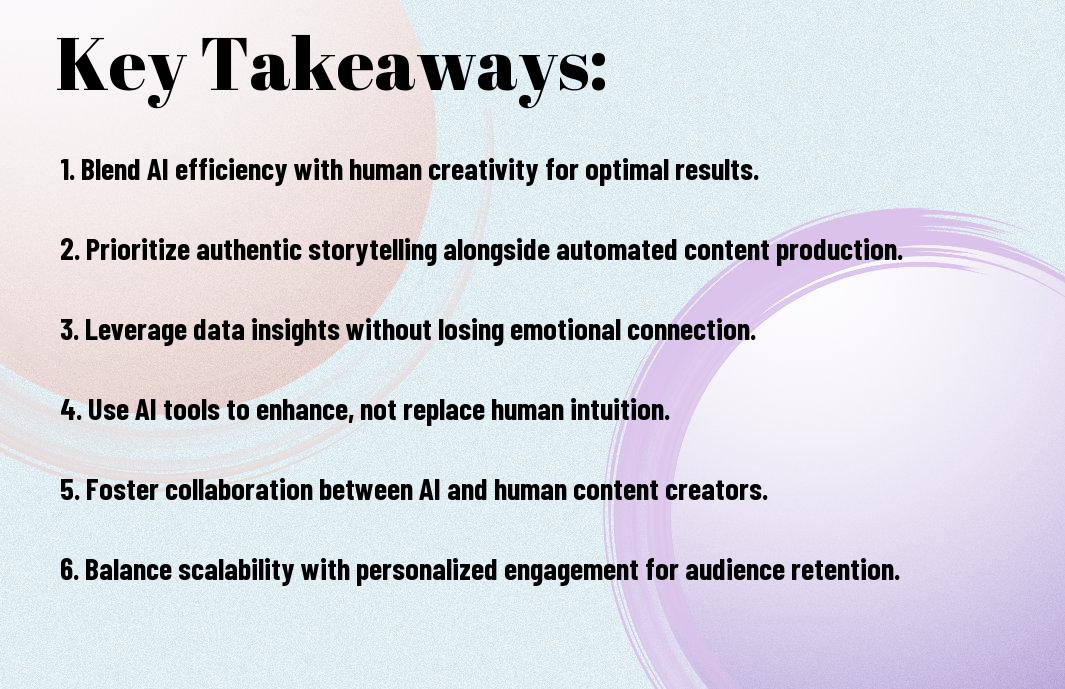
The Importance of Human Touch in Content
It is necessary to recognize the significance of incorporating the human touch within your content strategy. While artificial intelligence can analyze patterns, optimize content, and even generate text, it lacks the innate qualities that only humans possess. Elements such as empathy, creativity, and personal experience contribute to the formation of connections with your audience, enabling your message to resonate on a more profound level.
Emotional Intelligence in Content Creation
With the rise of digital communication, emotional intelligence has become a pivotal factor in content creation. Understanding your audience’s emotions allows you to tailor your messaging to meet their needs more effectively. By recognizing feelings such as joy, sadness, or frustration, you can create engaging content that speaks directly to them, fostering a sense of belonging and loyalty.
Your ability to infuse emotional intelligence into your content not only strengthens the bond you create with your readers but also enhances their overall experience. Connecting through shared emotions enhances the effectiveness of your message, ultimately driving higher engagement and conversion rates.
Building Brand Authenticity and Trust
The authenticity of your brand is foundational in cultivating trust with your audience. Your audience seeks genuine interactions and transparency when engaging with brands. By demonstrating commitment to your values and sharing your unique journey, you make it easier for potential customers to relate to your narrative, which can significantly impact their decision-making process.
A magnetic aspect of brand authenticity is its ability to foster a loyal community around your values. This loyalty strengthens relationships and encourages positive word-of-mouth marketing. When customers feel they can rely on your brand to be sincere and honest, they are more likely to advocate for your products or services and remain loyal in the long run.
The Role of Storytelling in Human Engagement
After all, storytelling is one of the oldest and most powerful tools in communication, allowing you to captivate your audience effectively. By weaving narratives that illustrate your brand’s values and mission, you invite your audience into your world, creating a more meaningful connection. Stories not only evoke emotions but also make your brand memorable, increasing the odds of your audience engaging with your content again and again.
Authenticity in storytelling is vital; when your audience detects that the story you share is genuinely yours, they feel an inner connection, deepening their engagement. This emotional bond may lead to increased loyalty and advocacy, aligning with your overall content strategy and ultimately fostering long-term success for your brand.

Identifying the Balance: When to Use AI vs. When to Engage Human Creators
After entering into the AI versus human creativity debate, you may wonder how to best strike a balance between the two. One approach is to first identify specific scenarios in your content strategy where each excels. You can explore insights on this topic by reading about AI vs. Human Creativity: Striking the Perfect Marketing Balance. This understanding will empower you to leverage the strengths of both AI and human creators effectively.
High-Volume Content Needs and AI Solutions
Between the demands of maintaining a consistent content calendar and producing large quantities of material, AI is your ally. It can quickly generate blog posts, social media updates, and even marketing emails, reducing the time-to-market while ensuring a steady flow of content. This capability allows you to focus on strategy and creativity, enabling you to allocate more resources to other important aspects of your business.
However, while AI can efficiently churn out content based on predefined parameters, it lacks the ability to infuse genuine creativity and understanding into each piece. This is where you need to evaluate the types of content you intend to create. For generic, high-volume demands, AI shines, but for nuanced topics that require human insight or storytelling, a human touch is necessary.
Situations Requiring Deep Emotional Connections
With emotionally charged content, the intricacy of human experience must guide your messaging. AI can analyze patterns and trends, but it cannot replicate the depth of human emotions or the subtleties in communication that resonate with an audience. Crafting compelling narratives that evoke feelings necessitate a human creator who understands the emotional landscape of your target demographic.
Moreover, your audience may connect more deeply with authentic stories that reflect their experiences, building loyalty and trust. While AI can help refine these stories or provide data-driven insights, the core narrative should come from human creators who possess empathy and emotional intelligence.
Understanding the essence of emotional storytelling is key. When your content aims to foster connections—whether it’s through personal stories, advocacy campaigns, or brand values—rely on the vibrancy of human insight, creativity, and authenticity. This emotional engagement will ultimately enhance the relationship between your audience and your brand.
Assessing Audience Expectations
With varying audience expectations across different platforms, identifying when to deploy AI and when to tap into human creativity is vital. Different demographics and niches may have diverse preferences for engagement levels, tone, and content types. Understanding these nuances allows you to tailor your approach, ensuring that your strategy is aligned with your audience’s needs.
The expectation landscape can change quickly, influenced by trends, cultural shifts, and evolving market conditions. Staying attuned to your audience’s feedback and preferences will help you gauge whether your content should resonate more deeply on a human level or if it can effectively be automated through AI solutions.
Balance your strategy by constantly reviewing audience expectations and adapting your content accordingly. Leveraging AI for content generation can streamline processes, but infusing your human voice ensures that your brand’s messaging remains authentic and relatable. By finding this equilibrium, you’ll be better positioned to meet both high-volume needs and deep engagement goals.
Case Studies of Successful AI and Human Collaboration
Now, let’s research into the transformative power of AI and human collaboration through specific case studies that showcase impressive results and novel strategies. These instances illustrate how integrating technology with personal touch can lead to remarkable outcomes.
- Spotify: Utilized AI algorithms for personalized playlists, boosting user engagement by 30% and increasing user retention rates to 90%.
- Netflix: Leveraged AI for content recommendations, which led to an increase in viewer hours by 75%. Their sophisticated algorithms analyze viewing habits to enhance viewer satisfaction.
- Unilever: Implemented machine learning in their marketing strategies, resulting in a 20% improvement in ad targeting effectiveness and reduced marketing costs by 15%.
- Amazon: Combined AI-driven product recommendations with human customer service, leading to a 40% increase in sales conversion rates during holiday seasons.
- Adobe: Employed AI through its Adobe Sensei platform for marketing content optimization, yielding a 30% enhancement in campaign performance for their clients.
Marketing Campaigns Enhanced by AI
Human creativity is complemented by AI’s analytical skills, producing standout marketing campaigns. Take the example of Unilever; their campaigns utilized AI-powered tools to analyze social media sentiment and customer behaviors, tailoring messages to resonate seamlessly with their audience. This approach heightened engagement and enabled them to deliver content that truly mattered to consumers, showcasing the potential of data-driven marketing.
Furthermore, Adobe’s integration of AI functionalities allowed marketers to predict trends and understand target demographics in depth. As a result, clients experienced significant improvements in campaign performance, allowing marketers to focus more on the creative aspects of their strategies. This synergy between AI efficiency and human intuition proves indispensable in today’s competitive landscape.
Brands That Flourished with Human-Driven Strategies
Beside the numerical prowess of AI, some brands thrived through a strong emphasis on human-driven storytelling and genuine connection with their customers. Brands like Coca-Cola capitalized on emotions, leading campaigns focused on unity and positivity, which resonated deeply with audiences. With a careful blend of authentic messaging and community involvement, they successfully fostered a loyal customer base.
Moreover, Patagonia’s commitment to environmental sustainability is a strong facet of their brand identity, aligning perfectly with the values of their target audience. This allows them to stand out in a crowded market and cultivate passionate customers who support their cause. The human element of these campaigns cultivates a profound relationship with their clientele, creating advocates rather than simply customers.
Case studies of brands like Coca-Cola and Patagonia demonstrate that a focus on human connection can lead to remarkable brand loyalty and advocacy. Their strategies highlight the importance of aligning with your audience’s values and creating messages that speak to their experiences. This emphasizes that, while data and technology are important, the genuine connection fostered through human-driven strategies can produce a significant impact.
Hybrid Approaches: Successful Implementations
Behind successful implementations, hybrid models have emerged as a preferred strategy for many brands seeking to balance AI efficiency with a human touch. A notable example is the online retailer Stitch Fix, which employs human stylists to collaborate with AI algorithms for personalized shopping experiences. This hybrid model resulted in over 200% growth, as customers feel personal attention while benefiting from smart technology recommendations.
Another example is Sephora, which uses AI to provide tailored product recommendations influenced by customer feedback and human stylists. Their interactive chatbot, combined with the expertise of beauty advisors, fosters a seamless shopping experience, leading to increased customer satisfaction and loyalty. This indicates that blending AI capabilities with human insights can yield superior outcomes, propelling brands towards success.
This convergence of AI and human-driven strategies can redefine what’s possible in your business. As the market continues to evolve, leveraging both systems creates a powerful synergy that harnesses technology’s capabilities while nurturing important human connections. This approach not only enhances performance but also builds a brand identity that resonates strongly with your audience.
Best Practices for Integrating AI and Human Expertise
Now, as you navigate the delicate balance between AI and human involvement in your content strategy, it’s important to establish a strong foundation. One way to do this is by setting clear content goals that align with both your brand’s vision and your audience’s needs.
Establishing Clear Content Goals
Below, you should articulate specific objectives that guide your content creation process. This involves identifying what you want to achieve, whether it’s increasing brand awareness, driving conversions, or enhancing customer engagement. By setting targeted goals, you can utilize AI tools to gather data and pinpoint trends that inform your strategy, ensuring that both AI and human contributions are aligned with these objectives.
Additionally, these goals should be flexible enough to adapt as you assess the performance of your content. Regular evaluation of your goals in conjunction with AI-driven analytics allows you to pivot and optimize strategies, blending human creativity with AI efficiency.
Collaborating Between AI and Human Teams
Human teams play an important role in interpreting data and nurturing the emotional intelligence that AI lacks. By facilitating collaboration between your AI tools and your human experts, you can capitalize on the strengths of both. Human insights can give context to the data provided by AI, ensuring that your content resonates on a deeper level with your audience.
Best practices in this collaboration involve regular meetings where team members can discuss findings from AI analytics and share creative ideas inspired by them. Encouraging an open dialogue fosters an environment where human creativity thrives while leveraging AI’s analytical prowess, leading to a more comprehensive content strategy.
Continuous Learning and Adaptation Strategies
After establishing collaboration, it’s vital to invest in continuous learning and adaptation strategies. Your team should always seek to integrate new technologies and methodologies that enhance efficiency and effectiveness. This means staying updated with the latest trends in AI and content creation, allowing you to refine your strategies proactively.
Moreover, fostering a culture of experimentation will empower your team to test and adapt new ideas without fear of failure. This mindset opens doors to discovering unique combinations of AI capabilities and human insights that can elevate your content strategy.
At the core of successful continuous learning is a commitment to feedback. Regularly solicit input from your audience and team members, using it not only to inform your content but also to improve the tools and processes you employ. This ongoing cycle of learning and adaptation is vital for staying relevant in a rapidly changing digital landscape.
Future Trends in AI and Content Development
All the evidence points to a future where AI technologies will fundamentally reshape the landscape of content development. As these tools become more sophisticated, emerging technologies are beginning to redefine the way you approach content creation and distribution. This includes advancements in natural language processing, image generation, and even video content creation. By harnessing these capabilities, you can expect a significant boost in your productivity and creativity, allowing you to engage your audience more successfully than ever before.
Emerging Technologies in AI Content Creation
Among the exciting developments in AI content creation are tools that leverage deep learning and machine algorithms to produce high-quality text, visuals, and audio. These tools are designed to enhance the efficiency of your content strategy, minimizing repetitive tasks and freeing up your time for more strategic thinking and creative pursuits. The integration of machine learning enables these tools to learn from your inputs and continuously improve their outputs, which means that your future campaigns could be more personalized and aligned with current trends.
As you adapt to these emerging technologies, it’s vital to understand their role not only in boosting production but also in influencing how your audience perceives your brand. Technologies like generative design and automated content curation can help tailor experiences that speak directly to your audience’s preferences and needs, paving the way for a more engaged community around your brand.
The Evolving Role of Human Creators
Any successful content strategy will continue to require the unique insights and emotional intelligence that only human creators can provide. AI may excel at analyzing data and automating processes, but it lacks the depth of understanding that comes from real-life experiences and authenticity. As a content creator, your role will likely evolve to focus more on strategic decision-making and creative direction, guiding AI tools rather than being replaced by them.
Technologies will continue to change the way you approach storytelling and audience engagement. As AI takes over more routine and analytical tasks, it will be up to you to infuse your unique voice and perspective into your content. This human touch not only differentiates your brand but also builds trust and connection with your audience. Therefore, your role will evolve into that of a curator and storyteller, choosing how best to leverage AI-generated content while maintaining a distinctive and relatable brand identity.
Predictions for Industry Changes
Before stepping into these new trends, it’s important to consider how current shifts in AI will impact content strategies across various industries. Your ability to adapt will determine whether you can utilize AI as a tool for greater outreach and engagement or if you risk falling behind in an increasingly competitive landscape. You should prepare for a future where AI not only automates processes but also enhances the decision-making capabilities within your content strategy.
Creators who actively embrace AI technology will likely find themselves at an advantage as they leverage these tools to enhance their creative capabilities and improve audience engagement. As AI evolves, expect a shift towards more personalized and data-driven content, which can lead to greater audience retention and loyalty. Prioritizing the balance between AI capabilities and your unique input will be key in navigating this ever-evolving landscape.
Ethical Considerations in AI Content Use
Keep in mind that the use of AI in content creation carries significant ethical considerations. As you navigate this landscape, it’s important to ensure that your audience understands when content has been generated by AI. Transparency in disclosing the use of AI can enhance credibility and foster trust among your readers. If you are producing articles, blog posts, or marketing materials with AI assistance, consider including a note that explains the role AI played in generating the content. This fosters a more informed audience who is aware of the technologies influencing what they read.
Transparency in AI-Generated Content
With the rapid growth of AI technologies, you must address the challenge of making your audience aware of AI-generated content. Disclosing the use of AI not only helps establish your authenticity but also allows your readers to critically assess the information presented to them. By openly sharing how AI contributes to your content creation process, you empower your audience to engage with the material more thoughtfully.
Addressing Bias and Fairness in AI Algorithms
Algorithms that generate content are often trained on large datasets, which can sometimes include biased or incomplete information. Understanding this fact is vital for you to address potential inequities that may emerge from AI-generated content. If your content leverages AI, it is imperative that you evaluate the sources that feed into these algorithms, ensuring they reflect a balanced perspective. This helps in minimizing the risk of perpetuating stereotypes or unfair narratives that could arise from the AI’s output.
The challenges posed by bias in AI algorithms highlight the importance of responsible data sourcing and curation. You can make significant strides toward promoting fairness in your content by actively engaging with algorithms that prioritize diversity in their training datasets. As a content creator using AI, it’s your responsibility to critically assess both the technology and the information it produces, striving to mitigate any lingering biases in the content you share.
Stakeholder Responsibilities
Transparency around AI’s role in content creation involves various stakeholders, including you as the content creator, the developers of AI tools, and the audience who consumes the content. You have a responsibility to ensure the information you provide is accurate and equitable, but so too do the AI developers in producing tools that minimize bias and promote ethical usage. By working collaboratively, all parties involved can contribute to a landscape that values strong ethical standards in AI-generated content.
Considering these responsibilities lends weight to your role in the ethical use of AI in content strategy. You should advocate for guidelines that ensure AI algorithms are regularly audited for bias and fairness. This proactive stance promotes a shared commitment to ethical practices among stakeholders, ultimately benefiting not just your content, but the wider community who consumes it.
Final Words
Hence, finding the right equilibrium between AI and the human touch in your content strategy is fundamental for maximizing engagement and effectiveness. As you navigate the rapidly evolving landscape of digital communication, it is vital to recognize the unique strengths of both AI tools and human creativity. AI can process vast amounts of data and identify patterns, making it invaluable for data-driven tasks, such as audience segmentation and content personalization. However, the emotive nuances and authentic storytelling that humans provide are indispensable for forging genuine connections with your audience.
By thoughtfully integrating AI capabilities while fostering a personal touch in your content, you can enhance your overall strategy. Seeking guidance on When to Use AI and When to Add a Human Touch can help you make informed decisions that resonate with your audience. Ultimately, it is the combination of efficiency and empathy that will set your content apart and drive lasting impact.
FAQ
Q: What is the main difference between AI-generated content and content created by humans?
A: The primary difference lies in the creation process and emotional connection. AI-generated content relies on algorithms, data patterns, and pre-existing knowledge to generate text. In contrast, human-created content is enriched with genuine emotions, personal experiences, and insights that resonate deeply with audiences. While AI can produce high volumes of content quickly, it often lacks the unique voice and emotional depth that human writers bring to the table.
Q: How can businesses effectively integrate AI and human touch in their content strategy?
A: Businesses can strike a balance by using AI for data analysis, content optimization, and generating initial drafts. Once the AI has provided a base, human writers can enhance the content by adding creativity, context, and a personalized approach. This collaborative model allows companies to maintain efficiency while also delivering engaging and authentic content that connects with their audience.
Q: Are there specific types of content where human touch is more important than AI?
A: Yes, certain types of content particularly benefit from a human touch, such as storytelling, opinion pieces, emotional narratives, and any content that requires sensitivity or in-depth knowledge of human experiences. For example, pieces focused on mental health or social issues often need the empathy and nuanced understanding only a human can provide, making the human touch vital for authenticity and relatability.
Q: In what ways can AI enhance human-led content creation?
A: AI can enhance human-led content creation by providing valuable insights through data analysis, identifying trending topics, and suggesting keywords for SEO optimization. It can also assist in streamlining the editing process, analyzing performance metrics to inform future strategies, and generating ideas that inspire human authors. This partnership allows for both efficiency and creativity, ultimately improving the overall quality and reach of the content.
Q: What should marketers consider when deciding to use AI in their content strategy?
A: Marketers should consider the target audience’s preferences and the nature of the content they wish to produce. Understanding the balance between automation and authenticity is crucial, as poorly executed AI content can feel impersonal and disengaging. Additionally, they should evaluate the specific needs of their brand and industry, determining areas where AI can add value without undermining the human connection that is often pivotal in establishing trust and loyalty among consumers.
Boosting SEO with AI-Optimized Content – Strategies and Best Practices
Many businesses often struggle to enhance their online presence, but by leveraging AI-optimized content, you can significantly improve your SEO performance. This blog post will guide you through effective strategies and best practices to harness the power of artificial intelligence for creating content that attracts visitors, engages readers, and boosts your search engine rankings. With the right techniques, you can stay ahead in the digital landscape, ensuring your content not only reaches your target audience but also meets their needs effectively.

Key Takeaways:
- Keyword Research: Utilize AI tools to identify high-traffic keywords that align with your content strategy and audience intent.
- Content Creation: Leverage AI-generated suggestions to create engaging and relevant content that meets the needs of your target audience.
- Optimization Techniques: Implement on-page SEO practices, including optimizing headlines, meta descriptions, and alt texts using AI insights.
- Content Personalization: Use AI to analyze user behavior and preferences, allowing for personalized content experiences that increase engagement and retention.
- Competitor Analysis: Employ AI-driven analysis to understand competitors’ strategies, helping to refine your own SEO tactics and gain a competitive edge.
- Performance Tracking: Utilize AI tools for tracking and analyzing content performance, enabling data-driven decisions to enhance future content efforts.
- Continuous Learning: Stay updated on AI advancements and SEO trends to continuously innovate and improve your content strategy.
Understanding SEO and AI
Your journey into optimizing your content for search engines begins with a clear understanding of Search Engine Optimization (SEO). SEO is a collection of strategies designed to improve the visibility of your website in search engine results pages (SERPs). By effectively employing these tactics, you can attract more organic traffic to your site, leading to increased engagement and potential conversions. The main goal of SEO is to ensure that your content is not only available but also relevant to the queries your audience is searching for.
The Fundamentals of SEO
One of the primary components of SEO is the use of keywords, which are the terms and phrases that users enter into search engines. By identifying and integrating these keywords into your content, you can help search engines understand the relevance of your pages. Additionally, on-page SEO factors such as title tags, meta descriptions, and image alt texts play a significant role in how your site ranks. Off-page SEO, including backlinks and domain authority, also contributes to your site’s overall credibility and trustworthiness.
Engaging with SEO also means focusing on the overall user experience. This encompasses factors like page load speed, mobile optimization, and even the readability of your content. When users find your site useful and easy to navigate, search engines are more likely to reward you with higher rankings, leading to an increase in your site’s visibility.
The Role of AI in Content Creation
Above all, AI is revolutionizing how you approach content creation. Artificial intelligence tools can analyze vast amounts of data to identify trends and patterns that inform which topics will resonate most with your audience. By leveraging AI, you can generate high-quality, relevant content that meets your audience’s needs more effectively than ever before. These tools don’t just assist in content generation; they also help with keyword optimization, ensuring that the necessary terms are included naturally throughout your writing.
In addition, AI can significantly enhance your ability to personalize content for different segments of your audience. By analyzing user behavior, AI tools can help you tailor your content to specific demographics, resulting in a more engaging experience for readers. This personalization combined with intelligent data analysis not only aids in creating content that aligns with SEO best practices but also enhances user satisfaction—a win-win in the competitive landscape of digital marketing.
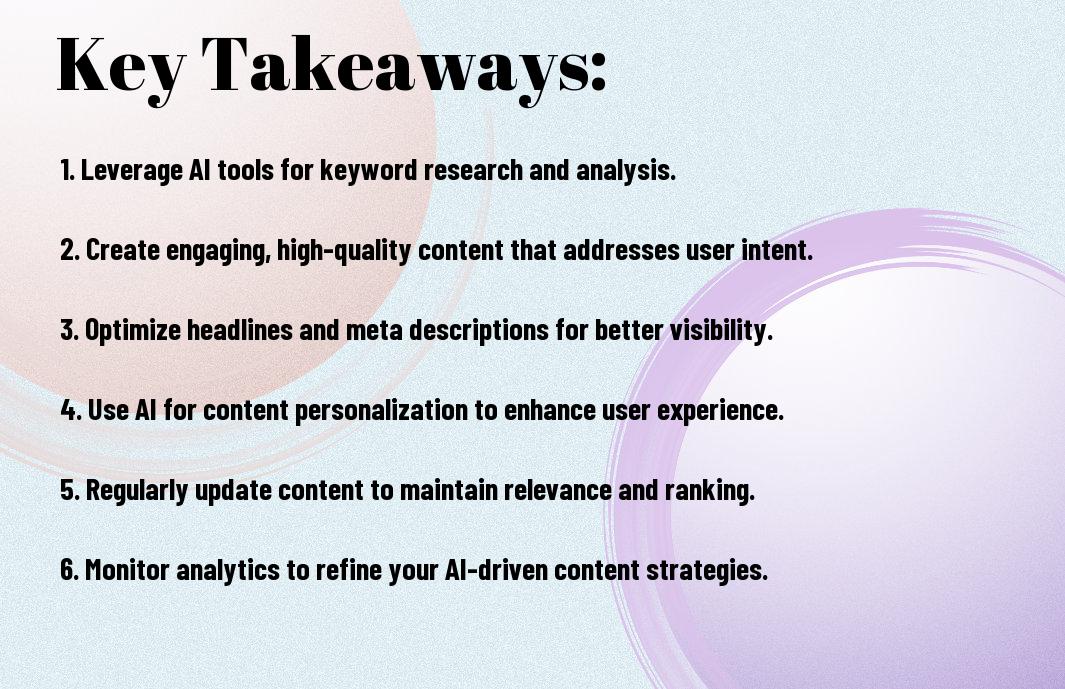
Benefits of AI-Optimized Content
There’s no denying that employing AI-optimized content can dramatically enhance your SEO efforts. By integrating artificial intelligence into your content strategy, you gain access to sophisticated tools that can analyze vast amounts of data, leading to improved results in your online visibility. This modern approach not only saves time but also provides insights that traditional methods may overlook. Ultimately, the benefits of AI-optimized content extend beyond mere ranking improvements, influencing user behavior and overall website performance.
Enhanced Keyword Research
Content optimization begins with an understanding of the keywords that drive traffic to your site. AI can help you identify these key phrases more effectively than manual methods. Using advanced algorithms, AI tools can analyze search trends and user intentions, delivering a list of potential keywords tailored specifically to your niche. This means that you can target terms that are not only popular but also relevant to your audience, allowing you to craft content that resonates with potential readers.
Furthermore, AI tools can provide insights into keyword difficulty and competitiveness, enabling you to optimize your strategy accordingly. You’ll be able to identify low-competition keywords that represent untapped opportunities for your content, ultimately resulting in a more efficient ranking strategy. By leveraging AI in your keyword research, you ensure that your content doesn’t just exist in a vacuum; instead, it becomes part of a larger conversation within your industry.
Improved Content Relevance and User Engagement
Engagement is a key factor in determining your content’s performance. AI-driven insights enable you to assess what your audience truly values, allowing you to create articles that address their specific interests and needs. By analyzing user behavior and preferences, AI can help you develop content that is not only more relevant but also encourages interaction. This leads to higher engagement rates, illustrating to search engines that your website provides substantial value to users.
Considering the vast amount of content available online, it’s crucial that your material stands out by addressing the unique preferences of your audience. AI can analyze past user data and recognize patterns that inform you about your readers’ likes and dislikes. This means satisfaction isn’t just about quality; it’s about delivering what your audience wants when they want it, ultimately helping you build stronger connections with potential customers.
Efficiency in Content Generation
For many creators, content generation can be a time-consuming task. Utilizing AI tools significantly streamlines this process. Automated content generation capabilities allow you to produce drafts quickly, meaning you can focus your efforts on refining and perfecting your messaging without sacrificing quality. With AI at your side, you can embrace a *number* of formats, making it easier to cater to the various types of content your audience prefers, whether it be blog posts, social media updates, or promotional materials.
A particularly noteworthy aspect of AI-generated content is its ability to deliver a practical framework that ensures consistency across your publications. This consistency is crucial for successful branding and helps maintain your audience’s trust. As you leverage AI to enhance your content generation process, you’ll find that your ability to produce high-quality, engaging material at scale improves, ultimately driving better results in your SEO initiatives.

Developing an AI-Driven Content Strategy
After identifying the role AI can play in boosting your SEO efforts, you’ll want to launch on developing an AI-driven content strategy. This approach centers around tailoring your content to resonate with your target audience while maximizing search engine visibility. By utilizing AI technologies, you can streamline this process, making it both efficient and effective.
Identifying Target Audiences
Content creation begins with a deep understanding of your target audiences. Knowing who they are helps you craft content that meets their needs and interests. Use AI tools to analyze demographic data, behavioral patterns, and preferences. This information allows you to segment your audiences effectively, which means you can create customized content that appeals to each specific group. Tailoring your message not only enhances engagement but also fosters loyalty, increasing the likelihood of conversions.
Furthermore, AI can facilitate the identification of emerging trends within your audience. By tracking search behaviors and social media interactions, you can uncover what topics are trending and gain insights on what your audience craves. This data-driven approach empowers you to create timely, relevant content that drives traffic to your website.
Setting Clear SEO Goals
One of the first steps in your content strategy should be setting clear SEO goals. Outline what you hope to achieve with your content, whether it’s increasing organic traffic, improving search ranking for specific keywords, or enhancing user engagement metrics. Establishing measurable objectives ensures that your efforts are focused and aligned with your overall business goals.
By defining these goals, you also create benchmarks that will help you assess the performance of your content-related efforts. Analyzing these metrics will enable you to understand which strategies work best for your audience and which areas may require adjustment or improvement. This approach allows for continuous optimization as your content strategy evolves.
Indeed, setting clear goals also leads you to prioritize content that aligns with your SEO objectives. This targeted content creation helps in efficiently allocating resources, ensuring you focus on developing high-impact topics that drive your desired results and communicate your brand’s message effectively.
Leveraging AI Tools for Content Insights
Content strategy can greatly benefit from leveraging AI tools for content insights. These tools analyze vast amounts of data to pinpoint gaps in your current content offerings, revealing opportunities for new topics or deeper coverage of existing subjects. By trusting AI to process this information, you can streamline your content ideation process, allowing you to create content that is both relevant and valuable to your audience.
Apart from identifying gaps, AI tools can also help you optimize your current content by suggesting enhancements based on trending keywords and phrases. Integrating these insights into your strategy keeps your content aligned with the interests and needs of your audience, and it positions your brand as an authority in your niche.
Leveraging the power of AI insights not only helps in creating better content but also equips you with the knowledge to stay ahead of competitors by anticipating what users seek. This strategic advantage enhances your ability to meet the ever-evolving needs of your audience, ensuring your SEO efforts yield the expected positive results.
Best Practices for Creating AI-Optimized Content
Many marketers and content creators are increasingly leveraging artificial intelligence to enhance their SEO strategies. By implementing best practices when creating AI-optimized content, you can stay ahead of the competition. For deeper insights on this subject, refer to A Guide to SEO Content and AI. This guide provides valuable information that can support your content optimization endeavors.
Utilizing AI for Keyword and Topic Discovery
Best practices in keyword and topic discovery involve harnessing AI tools that analyze search trends, semantic relationships, and user behaviors. By using these tools, you can identify keywords that not only resonate with your target audience but also align with the latest search engine algorithms. This method of discovery ensures that your content is relevant and optimized from the ground up.
Furthermore, AI can generate topic ideas based on existing content gaps in your niche. By analyzing what competitors are publishing and the type of content that performs well, you can create high-impact articles that fill missing links in the conversation. This strategic approach allows you to captivate your audience while improving your overall SEO performance.
Crafting Quality Content with AI Assistance
Content creation can be significantly enhanced by utilizing AI tools. These tools not only assist in drafting articles but also ensure that the content remains engaging and coherent. Using AI-generated suggestions, you can craft customized pieces that speak directly to your audience’s interests and pain points.
With AI’s capability to analyze large datasets, you can create content that is well researched and factually accurate. For example, AI can assist in compiling statistics or citing reputable sources, thus enhancing the credibility of your content. This level of detail is vital for retaining your audience’s trust and encouraging them to share your content.
Implementing Natural Language Processing Techniques
Above all, employing Natural Language Processing (NLP) techniques can greatly enhance the readability and user-friendliness of your content. These techniques allow you to optimize your writing style, ensuring that it aligns with the linguistic patterns preferred by your target audience. This not only keeps your readers engaged but also benefits your SEO as search engines prioritize quality content that resonates with users.
Assistance from NLP tools can help ensure your content is structured logically, highlighting the most relevant information clearly and concisely. By analyzing the sentiment and tone of your content, these tools ensure that your message is communicated effectively, ultimately improving user satisfaction and engagement rates. This thoughtful integration of NLP can elevate your content’s impact and visibility in search engine results.
Measuring the Effectiveness of AI-Optimized Content
Once again, understanding the effectiveness of your AI-optimized content is imperative for driving continuous improvement. You need to leverage specific metrics to assess how well your content performs in terms of search engine visibility and user engagement. For an in-depth exploration of the intersection between AI and SEO, check out A Guide to AI and SEO. By focusing on the right indicators, you can identify areas for enhancement and maximize the benefits of your optimization efforts.
Key Performance Indicators (KPIs)
Below are the key performance indicators (KPIs) you should monitor closely to gauge your AI-optimized content’s performance. Metrics such as organic traffic, bounce rates, page loading speed, and social shares can provide insight into user engagement and the effectiveness of your SEO strategies. Tracking these indicators allows you to establish a baseline that can help you understand how your content evolves over time.
Furthermore, measuring the click-through rate (CTR) on your titles and meta descriptions can reveal how compelling your content is to users upon search results. If the CTR is low, it might indicate that your titles need better optimization or that the content does not resonate sufficiently with your audience’s interests.
Analytics Tools for SEO Monitoring
Performance analysis is made significantly easier with the right set of analytics tools. Tools like Google Analytics, SEMrush, and Ahrefs allow you to track various metrics including traffic sources, user behavior, and keyword rankings. These insights can help you pinpoint which AI-optimized content resonates best with your audience and drives the most engagement.
Considering the vast array of data provided by analytics tools, it is vital that you customize your dashboard to focus on the metrics that matter most to your specific goals. Your tools should ideally present a clear picture of your strengths and weaknesses regarding SEO performance, enabling you to make data-driven decisions.
Adjusting Strategies Based on Data Insights
Data insights are instrumental in refining your content strategy going forward. By analyzing specific performance trends, you can make informed adjustments to your content, thereby enhancing both its relevance and reach. For instance, if you observe that certain keywords yield high traffic but low conversion rates, it might be time to tweak the associated content or call-to-action elements.
Due to the rapid changes in search engine algorithms and user preferences, continuously revisiting and adjusting your strategies based on data insights is necessary for maintaining relevance in your market. This proactive approach will not only enhance your SEO performance but can also establish your brand as an authority in your niche.

Common Challenges and Solutions
All content creators face various challenges when using AI to optimize their SEO strategies. Understanding these challenges and identifying effective solutions can significantly improve your approach. The most common challenges include ensuring content quality, addressing duplicate content issues, and finding the right balance between automation and human touch. By tackling these challenges head-on, you can harness the full potential of AI to enhance your SEO performance.
Overcoming Content Quality Concerns
An area of concern in AI-generated content is the perceived lack of quality. You may worry that automated writing tools compromise creativity and depth. To address this, it is imperative to use AI as a tool rather than a replacement for your unique voice. Leverage AI’s strengths in data analysis and keyword optimization while still incorporating your own insights and expertise. This hybrid approach enables you to produce content that is both engaging and SEO-friendly.
Moreover, regular content review and editing are important practices. You can utilize AI tools for initial drafts or to gather information, but taking the time to refine and polish your work ensures that the final product meets your standards and resonates with your audience. By actively participating in the content creation process, you maintain the quality that both search engines and users value.
Addressing Duplicate Content Issues
For many content creators, duplicate content can present a significant hurdle. Search engines penalize sites that contain replicated content, which can affect your visibility and rankings. To combat this, you should ensure that each piece of content you produce is unique and thoroughly original. AI tools can assist in generating variations on topics, but it’s important that you add your own insights and angles to differentiate your content.
Further, implementing a content audit strategy is beneficial. Regularly reviewing your website for duplicate content ensures that you remain compliant with SEO best practices. Utilize tools that can analyze your existing content and identify any instances of duplication. By addressing these issues early and recalibrating your strategy, you can maintain your website’s integrity and enhance its performance in search engine results.
Balancing Automation with Human Touch
Across the SEO landscape, finding the right balance between automation and a personal touch is imperative for effective content generation. While AI can process data and generate content at a rapid pace, having a human element ensures that the content remains relatable, engaging, and contextually appropriate. Strive to strike a balance where you can automate certain tasks, like keyword research and data analysis, while still providing your unique perspective and emotional connection.
And, this balance enables you to scale your content efforts without sacrificing quality. By understanding when to lean into automation and when to apply your expertise, you can optimize your content for search engines while still resonating with your audience. Enriching content with personal anecdotes, case studies, and user experiences makes it more likely that your readers will engage and share it, ultimately enhancing your SEO results.
Future Trends in SEO and AI
Unlike the traditional methods of SEO that relied heavily on keyword stuffing and backlinks, the future of SEO is rapidly evolving. As technology continues to advance, search algorithms are becoming increasingly sophisticated. This evolution is paving the way for a more user-centric approach, which values quality content and relevance over mere optimization tactics. You need to be aware that these changes are not just a passing trend; they represent a shift towards enhancing the overall user experience when interacting with search engines.
The Evolution of Search Algorithms
At the core of this transformation is the progression of search algorithms. Over the years, major updates like Google’s Panda, Penguin, and Hummingbird have aimed to weed out low-quality content and reward authentic sources. As these algorithms become more refined, they are increasingly capable of understanding the context and intent behind each search query. Thus, your SEO strategies must also adapt by focusing on providing informative, engaging content that genuinely addresses users’ needs and queries.
AI Advancements in Content Creation
Among the technologies shaping the future landscape of SEO is artificial intelligence, which is revolutionizing content creation. Recent advancements in AI tools allow you to generate high-quality content tailored to your audience’s preferences and interests efficiently. These tools analyze vast amounts of data to determine what resonates with readers, enabling you to create personalized and relevant content that stands out in search results.
Considering the rapid pace of AI development, it’s important for you to stay informed about the latest tools that can aid in your content creation process. AI not only offers insights into trending topics but also assists in optimizing content for SEO by recommending keywords and headlines that are likely to drive traffic. By leveraging these advancements, you can create a cohesive strategy that keeps you competitive in the ever-evolving digital landscape.
Preparing for the Next Generation of SEO
Below the surface, it’s evident that the next generation of SEO will require a different skill set, one that encompasses both technical and creative abilities. As AI continues to enhance the way content is produced and consumed, you must shift your focus towards creating an engaging user experience. This means optimizing not just for search engines, but also for the human audience, integrating factors such as voice search and mobile usability into your strategies.
Generation after generation of SEO practices will demand that you remain flexible and adaptable to the changing landscape. Embracing new technologies, understanding the implications of AI advancements, and preparing for changes in algorithmic criteria are all part of ensuring your content remains visible and relevant. Adaptation will be your key to thriving in this new era of digital interaction.
Conclusion
Hence, you have explored various strategies and best practices for boosting your SEO with AI-optimized content. By understanding the power of AI in content creation and optimization, you can create material that not only resonates with your audience but also aligns with search engine algorithms. Employing techniques such as keyword research, content structuring, and utilizing AI tools can significantly enhance your online presence. By implementing these strategies, you position yourself as an authority in your niche, attract more visitors to your site, and improve your overall search rankings.
As you move forward, don’t overlook the impact of staying updated with the latest trends in SEO and AI. Continuous learning will equip you with the necessary tools and insights to pivot your strategies effectively. For a deeper understanding of how you can optimize your content for AI, consider checking out The Future of SEO: How to Optimize Your Content for AI …. Embrace these changes, and watch your SEO efforts yield fruitful results that elevate your brand visibility.
FAQ
Q: What is AI-optimized content and how does it relate to SEO?
A: AI-optimized content refers to text that has been created or enhanced using artificial intelligence tools. These tools analyze data to identify the most effective keywords, phrases, and structures that can improve a webpage’s visibility in search engine results. By leveraging AI to fine-tune content for SEO, businesses and content creators can enhance their chances of ranking higher on search engines and attracting organic traffic.
Q: What are some strategies for creating AI-optimized content?
A: To create AI-optimized content, consider implementing the following strategies:
1. Utilize keyword research tools powered by AI to identify high-traffic keywords relevant to your topic.
2. Personalize content based on audience analysis, ensuring that it speaks to the reader’s interests and needs.
3. Structure your content with headings and bullet points for better readability, and align it with best practices for on-page SEO.
4. Use AI-driven writing assistants to enhance grammatical accuracy and coherence, making the text more engaging.
5. Continuously analyze content performance through analytics tools to iteratively improve SEO strategies based on user behavior.
Q: What are some best practices for incorporating AI-generated content into a website?
A: When incorporating AI-generated content into a website, adhere to the following best practices:
1. Ensure original content creation to avoid duplication penalties from search engines.
2. Review and edit AI-generated content for clarity and relevance, maintaining a human touch.
3. Optimize meta tags, including title and description, using insights from AI tools.
4. Implement internal and external linking strategies to enhance content value.
5. Regularly update the content based on performance metrics and changes in search engine algorithms.
Q: How can I measure the effectiveness of AI-optimized content for SEO?
A: The effectiveness of AI-optimized content can be measured through various metrics, such as:
1. Organic traffic levels: Monitor changes in the number of visitors arriving through search engines.
2. Search engine rankings: Use tools to track where your content ranks for targeted keywords before and after optimization.
3. Engagement metrics: Assess time spent on the page, bounce rates, and user interactions to gauge content appeal.
4. Conversion rates: Analyze whether the optimized content leads to desired actions, such as sign-ups or purchases.
5. Backlink acquisition: Keep track of any backlinks gained post-implementation, as these can further boost SEO performance.
Q: Are there any limitations to using AI in optimizing content for SEO?
A: While AI can significantly enhance content optimization, there are limitations to consider:
1. Lack of nuanced understanding: AI tools may not fully grasp context or emotional tone, potentially leading to generic content.
2. Dependency on data: The effectiveness of AI-generated insights is contingent on the quality of input data, which can be incomplete or biased.
3. Algorithm changes: Search engines frequently update their algorithms, which may not be accounted for by AI tools immediately.
4. Brand voice consistency: Maintaining a unified brand voice requires careful human oversight in the editing phase post-AI generation.
5. Over-optimization risk: Relying too heavily on AI might result in content that feels overly optimized, potentially deterring readers and diminishing authenticity.
Case Studies – Success Stories of Brands Leveraging AI in Content Marketing
You have the opportunity to explore how leading brands are transforming their content marketing strategies through the power of AI. These success stories highlight the practical applications of artificial intelligence that can enhance your brand’s audience engagement and drive conversions. From personalization to automation, these case studies showcase the innovative ways companies are using AI to solve common challenges in content creation and distribution. For deeper insights, check out these 4 Incredible AI Case Studies in Content Marketing that could inspire your own strategies.
Key Takeaways:
- Personalization: Brands utilizing AI have significantly improved user experience by delivering highly personalized content based on customer preferences and behaviors.
- Efficiency: Automation of content creation and distribution processes allows companies to produce content rapidly, enhancing overall operational efficiency.
- Data Insights: AI tools enable brands to analyze vast amounts of data, providing valuable insights into customer trends and content performance.
- Enhanced Engagement: AI-driven content strategies lead to higher engagement rates, as brands can create tailored messages that resonate with their audiences.
- Predictive Analytics: Leveraging AI for predictive analytics helps brands anticipate future customer needs and adjust their content strategies accordingly.
- Visual Content Generation: Some companies have successfully employed AI to create engaging visual content, further enriching their marketing campaigns.
- Cost-Effectiveness: By streamlining content processes and improving targeting, AI implementation often results in reduced marketing costs for businesses.
Understanding AI in Content Marketing
While content marketing continues to evolve, the integration of artificial intelligence (AI) brings a transformative edge to the way brands engage with their audiences. AI in content marketing refers to the use of intelligent algorithms and machine learning techniques to produce, distribute, and personalize content for consumers. By leveraging AI, brands can analyze consumer behaviors, predict trends, and tailor their messaging to meet the specific needs of their target demographics, resulting in a more engaging and relevant experience.
Definition of AI in Content Marketing
Against this backdrop, AI in content marketing encompasses a range of technologies that enhance various aspects of the content lifecycle. From automated content creation to advanced analytics that inform strategy, AI allows marketers to utilize data in real time, ensuring that their content remains compelling and effective. This technology streamlines processes, delivering content that resonates with your audience on a personal level.
As AI tools continue to develop, brands are given new opportunities to optimize their marketing efforts. For instance, AI can help you segment your audience based on behavior and preferences, ensuring that the right content reaches the right people at the right time. This results in greater engagement and improved ROI, as your content efforts are directed more effectively.
Importance of AI in Today’s Digital Landscape
On the other hand, the significance of AI in today’s digital landscape cannot be understated. As competition intensifies across various platforms, brands must leverage innovative tools to capture and retain consumer attention. AI equips you with the insights needed to make data-driven decisions, enhancing your marketing strategies in real-time. This agility not only promotes personalization but also allows you to respond to changing market dynamics swiftly.
Plus, employing AI in content marketing enables you to optimize your campaigns with greater accuracy. By analyzing large data sets, AI technologies can uncover patterns and trends that human analysts may overlook. This advanced level of insight means you can create content that precisely aligns with your audience’s current interests, potentially boosting conversion rates and customer satisfaction significantly.
Key AI Technologies Used in Content Marketing
Behind the scenes, several key AI technologies are shaping the future of content marketing. Natural Language Processing (NLP), for example, allows for the generation of human-like text which can be utilized for blogs, articles, and social media posts. Additionally, machine learning algorithms help in audience segmentation and predictive analytics, offering tailored recommendations based on user behavior. These technologies empower you to personalize content at scale, ensuring that each interaction is meaningful to your audience.
Marketing automation platforms are also heavily reliant on AI capabilities. They simplify the process of managing campaigns, tracking results, and adjusting strategies as necessary. Access to real-time analytics ensures that you can pivot quickly if required, maintaining relevance amidst the fast-paced nature of digital marketing. Overall, the fusion of these technologies not only elevates your content marketing efforts but also positions your brand ahead of the curve.
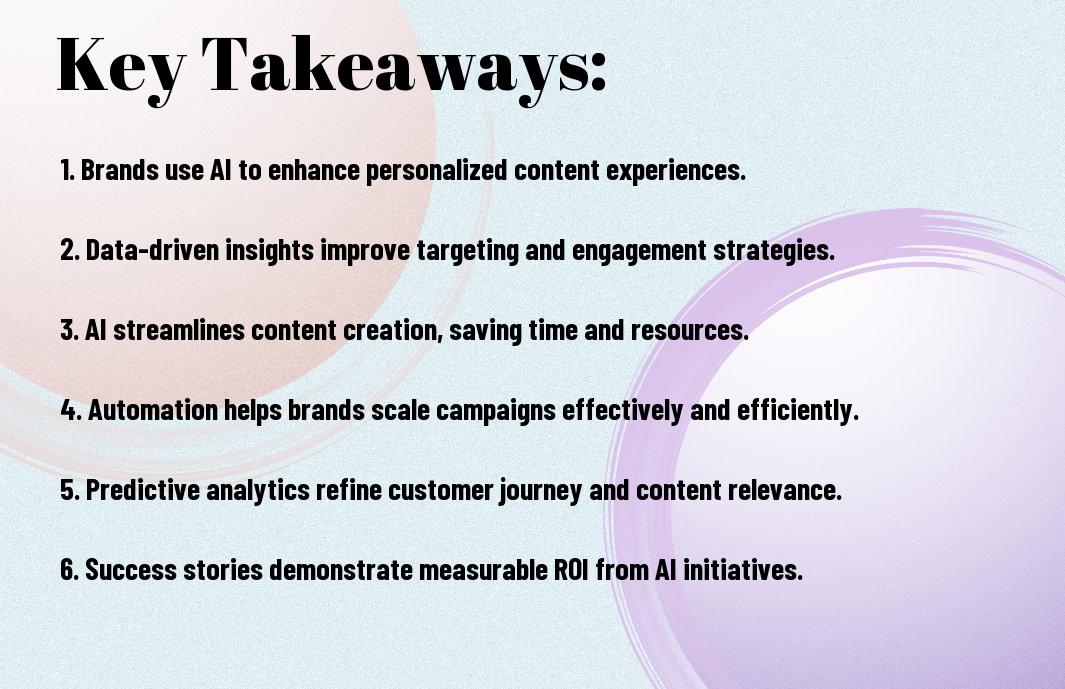

Success Stories of Brands Leveraging AI
Some brands have successfully harnessed the power of AI to transform their content marketing strategies, resulting in not only better engagement but also enhanced customer satisfaction. Below are a few notable case studies that exemplify how leveraging AI can yield substantial benefits.
Case Study 1: Coca-Cola
Among the many innovative strategies Coca-Cola has employed, their use of AI in content marketing stands out. The brand capitalized on data analytics to predict consumer preferences and tailor its marketing campaigns accordingly. By analyzing customers’ interactions on social media platforms, Coca-Cola learned what flavors, colors, and themes resonated most with their audience. This informed decisions on new product launches and promotional content, leading to more targeted and impactful messaging.
Furthermore, Coca-Cola utilized AI tools for creating personalized content, ensuring that their advertisements were not just widely broadcast but genuinely appealing to individual consumers. They achieved this through programmatic advertising, which allowed them to modify their messages in real time based on user engagement and feedback, further solidifying their connection with customers.
Case Study 2: Nike
On the frontier of AI integration, Nike has also made remarkable strides in content marketing. Their approach combines data analytics with creative storytelling, producing campaigns that resonate deeply with their target audience. Using AI-driven insights, Nike crafts tailored messages that speak directly to consumer preferences and behaviors. This technique has helped them stay relevant in a competitive market, attracting customers who value personalized experiences.
Nike’s marketing strategies include leveraging AI for social media listening, allowing them to analyze consumer sentiment surrounding their products. This intelligence guides their campaign development and aligns their branding efforts with real-time consumer interests, taking customer engagement to the next level.
Nike’s commitment to data-driven storytelling has allowed them not only to optimize their content marketing but also to build a community around their brand, turning customers into loyal advocates.
Case Study 3: Starbucks
Brands like Starbucks have utilized AI to enhance their customer interactions significantly. By implementing machine learning algorithms, Starbucks has been able to predict what products customers are likely to buy based on their previous purchases and preferences. This data-driven approach allows the company to personalize marketing communications effectively, thereby increasing customer loyalty and driving sales.
Moreover, Starbucks employs AI in its mobile app to recommend drinks to users, providing personalized offers and further engaging them in the brand’s experience. This level of customization not only improves customer satisfaction but also boosts the effectiveness of their marketing initiatives.
Another aspect of Starbucks’ implementation of AI is their investment in chatbots to facilitate customer interactions. This not only streamlines service but also gathers invaluable data on customer preferences and trends.
Case Study 4: Unilever
Below the surface of Unilever’s extensive brand portfolio lies a sophisticated use of AI to drive content marketing strategies. The company conducts comprehensive data analysis to understand market trends and consumer behavior. This approach allows Unilever to craft highly insightful and engaging content that resonates with different audience segments. By identifying gaps in the market, they can tailor their products and marketing efforts to meet emerging needs.
Additionally, Unilever utilizes AI for optimizing their advertising, using tools that analyze ad performance in real time. This enables them to adapt their campaigns dynamically, ensuring maximum visibility and engagement with consumers.
Personalized marketing is at the heart of Unilever’s strategy, as they develop content and offers that reflect an understanding of local nuances and individual preferences. This dedication to personalization significantly enhances customer experiences and solidifies brand loyalty.
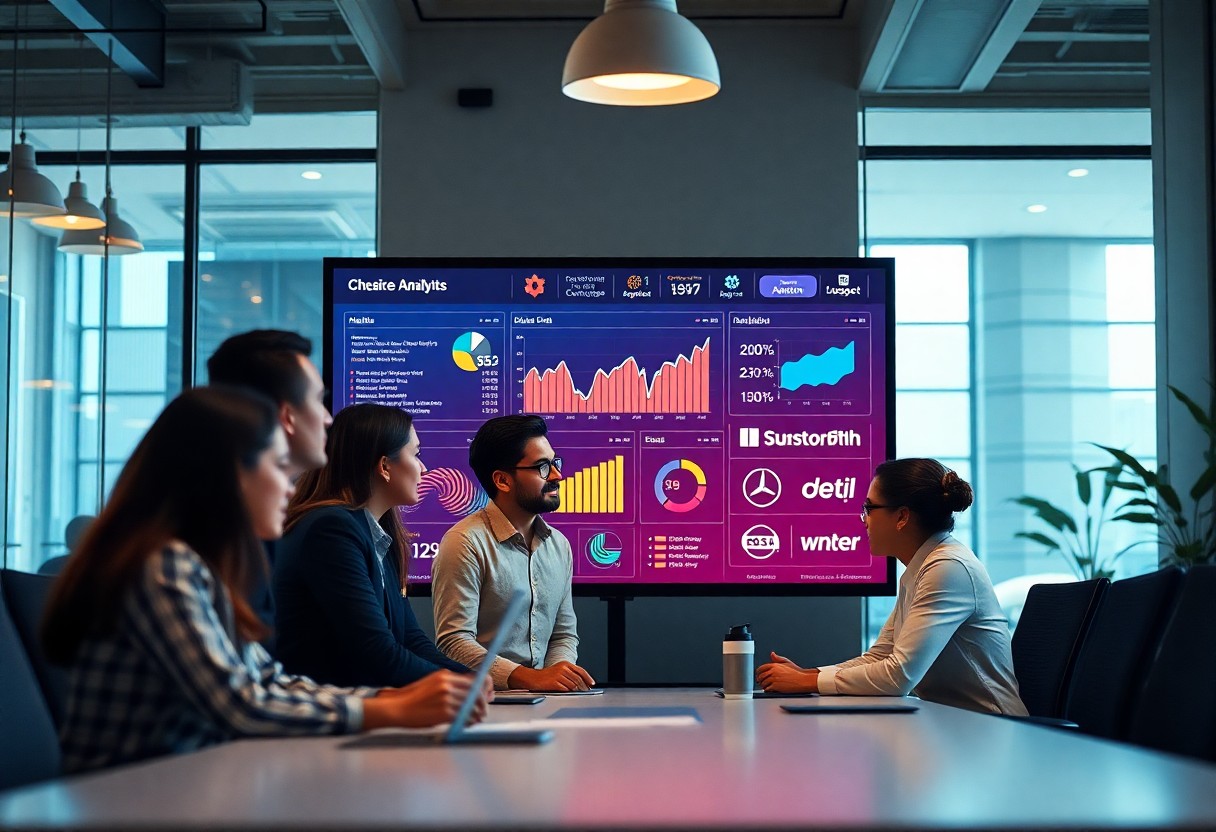
AI Tools and Platforms for Content Marketing
For marketing professionals navigating the rapid advancements in technology, leveraging AI tools can significantly enhance content marketing strategies. These tools are designed to optimize various aspects of content creation, distribution, and analysis, enabling brands to engage their audiences more effectively. As brands strive to stand out in a crowded market, these AI-driven resources can provide the edge needed to succeed.
Overview of Leading AI Tools
Before entering into the specifics, it’s vital to recognize some of the leading AI tools available today. Platforms like Jarvis (now known as Jasper), Copy.ai, and Frase are at the forefront, helping you to generate high-quality content quickly and efficiently. These tools harness natural language processing (NLP) and machine learning capabilities to understand audience preferences and create tailored content that resonates with users.
Features and Benefits of Each Tool
One of the standout features of tools like Jasper is their ability to generate a variety of content formats, from blog posts to social media updates, providing you with versatility in your content marketing efforts. Copy.ai offers templates specifically designed for different content needs, enabling you to save time while maintaining quality. In addition, Frase emphasizes optimization, helping you to align your content with SEO best practices, thus improving your online visibility and search rankings.
Indeed, each tool comes with its own unique advantages that cater to different aspects of content marketing. Some tools offer integrated analytics to measure engagement and effectiveness, while others focus on collaboration features that allow your team to work seamlessly together. The variety ensures that you can find a solution that aligns with your specific objectives and operational requirements.
Selecting the Right AI Tool for Your Brand
Tools can also vary significantly in terms of pricing, functionality, and user interface. Consider your team’s technical expertise and your content goals when selecting a tool. For example, if you are a small business owner, a cost-effective tool with straightforward features may be more beneficial than a high-priced option with complex capabilities. Assessing these factors will help you to choose a tool that not only fits your budget but also supports your content marketing needs.
For instance, if your focus is on creating engaging social media content, a tool with strong automation and scheduling features might be ideal. On the other hand, if your primary goal is search engine ranking, investing in a tool with optimization capabilities is vital. Taking the time to evaluate your brand’s specific needs against what each tool offers will lead to a more effective content marketing strategy.
The Role of Data in AI-Driven Content Marketing
To effectively harness the potential of AI in content marketing, businesses must recognize the importance of data as the foundation upon which AI algorithms operate. Your data collection and analysis practices will ultimately determine the success of your AI initiatives. For a deeper understanding of successful applications, you can explore 10 Real-Life AI in Marketing Examples and Use Cases that highlight how brands are leveraging data for remarkable results.
Importance of Data Collection and Analysis
Across the vast landscape of digital marketing, effective data collection serves as a cornerstone for AI-driven content strategies. By meticulously gathering a variety of data points, you can enable AI to process and analyze them, providing valuable insights to tailor your marketing efforts. This enables your content to not only resonate with your target audience but also enhances user engagement.
Understanding your audience’s preferences and behaviors is necessary for optimizing your content. Your analysis should focus on identifying patterns and trends, which can guide your content creation process in a more personalized manner. By doing so, you position your brand to meet the evolving needs of your customers, ultimately driving improved outcomes.
Types of Data Leveraged in AI Marketing
Analysis of AI marketing practices reveals several key types of data that brands leverage to amplify their content strategies. This data can be categorized primarily into the following lists:
| User Behavior Data | Understanding how users interact with content |
| Demographic Data | Insights about age, gender, location |
| Engagement Metrics | Clicks, shares, and comments on various content |
| Purchase History | Data on past purchases that influences future content |
| Sentiment Analysis | Understanding customer sentiments towards your brand |
AIDriven strategies allowing for a combination of these data types ensure your marketing efforts are aligned with consumer needs and behaviors. Continuous monitoring and adapting to changes in this data landscape can pave the way for innovative content marketing strategies that resonate with your audience.
- User Behavior to enhance engagement
- Demographic Insights for targeted marketing
- Engagement Metrics to measure content success
- Purchase History for relevant content
- Sentiment Analysis to adjust strategies
Perceiving the importance of these varied types of data equips you with the insights necessary to craft content that meets audience expectations effectively. By harnessing an array of data, brands can continually enhance their marketing strategies.
Ethical Considerations in Data Usage
Data is a powerful tool in your marketing arsenal, but with great power comes the need for responsibility. As an advocate for ethical data usage, you must prioritize transparency and integrity in your practices. Your customers should be aware of how their data is being utilized and have a choice in whether their information is collected.
Rising concerns surrounding data privacy call for a proactive approach to ethical considerations. By ensuring compliance with regulations such as GDPR and CCPA, you safeguard your brand’s reputation and build trust with your audience. Prioritizing ethical data usage not only reinforces customer loyalty but ultimately contributes to long-term business success.
Marketing practices should focus on utilizing data responsibly while actively engaging with your audience. Understanding privacy implications, transparency in data usage, and adhering to legal requirements are paramount. Your commitment to these principles reinforces a positive brand image and fosters strong client relationships, paving the way for sustained growth in your marketing efforts.

Challenges and Limitations of AI in Content Marketing
Unlike many would hope, the integration of AI in content marketing does not come without its own set of challenges. As brands strive to implement AI technologies, they often encounter hurdles that can impede their success. AI can be a powerful tool, but understanding its limitations is key to harnessing its full potential. For deeper insights, explore Case Studies on Successful AI-Driven Marketing Campaigns to see how some brands have navigated these challenges.
Common Challenges Brands Face
Face it; every brand looking to integrate AI into their content marketing strategy might struggle with your initial setup and implementation. The lack of clear understanding of how AI can be applied to your specific content needs can lead to ineffective campaigns and wasted resources. Additionally, the necessary training data for AI models may not always be readily available or may be of insufficient quality, which can hamper the model’s performance.
Moreover, brands often need to grapple with the balance between automation and personalization. It’s a delicate tightrope walk; while AI excels at generating content quickly, it sometimes lacks the emotional intelligence that a human touch can provide. This disconnect can lead to content that feels impersonal, ultimately impacting audience engagement.
Limitations of Current AI Technologies
Content produced by AI is still predominantly limited by the algorithms and datasets it is built on. AI systems can struggle with context, nuance, and creativity. These limitations become apparent in scenarios that require a deep understanding of cultural references, emotional tones, or specific target audience needs. While AI can assist with data-driven insights, it often falls short of truly replicating human creativity and intuition.
Understanding the limitations of AI technologies is vital for brands that wish to leverage AI in their content marketing efforts. For instance, while AI-driven content can generate SEO-optimized articles at scale, it may lack the unique voice and storytelling elements that resonate with your audience on a deeper level.
Strategies to Overcome Challenges
Across various industries, brands have begun to adopt hybrid approaches that marry AI capabilities with human creativity. By combining the efficiency of AI with the unique insights and emotional understanding that only humans possess, you can create content that aligns well with your brand’s identity and audience preferences. Conducting regular audits of AI-generated content and actively encouraging human oversight in the creative process can greatly enhance the effectiveness of this technology.
Considering the fast-evolving nature of AI technologies, it is also vital to remain adaptive and continuously educate yourself and your team. Embrace a culture of learning where everyone is involved in exploring new AI tools and strategies that enhance your content marketing efforts. This proactive approach will help you to uncover solutions as challenges arise, transforming potential limitations into opportunities for growth.
Future Trends in AI and Content Marketing
Many brands are increasingly acknowledging the potential of AI in transforming their content marketing strategies. As you look towards the future, it’s imperative to consider how AI will continue to evolve and shape your marketing efforts. The advancements in machine learning algorithms and natural language processing will drive innovation, allowing brands like yours to create more personalized, relevant, and engaging content that meets the needs of your audience.
Predictions for AI Advancements
Marketing trends suggest that AI capabilities will expand significantly within the next few years. You can expect to see enhanced tools that can analyze consumer behavior, predict trends, and generate content with an even higher degree of sophistication. These advancements will not only streamline your content creation process but also help you understand your target audience more effectively. As a result, you can produce highly tailored content that resonates with your audience’s preferences.
Evolving Consumer Expectations
Marketing in the digital age has transformed consumer expectations. Today, your audience anticipates individualized experiences and instant gratification. With AI’s ability to analyze vast amounts of data and predict consumer behavior, you can tailor your content marketing strategies to align more closely with these expectations. In doing so, you can create immersive experiences that captivate your audience and foster loyalty.
Future consumer behavior will demand more personalized and real-time interactions, pushing you to adapt your strategies accordingly. As AI technologies advance, it’s crucial that your content marketing leverages these tools to meet the evolving preferences of your audience while simultaneously enhancing brand engagement.
The Growing Role of AI in Brand Strategy
By integrating AI into your brand strategy, you will gain access to powerful insights that can drive your marketing decisions. This integration allows for predictive analytics, enabling you to forecast trends and tailor your content to meet future demands effectively. As your brand navigates this changing landscape, embracing AI can help you stay ahead of the competition and ensure your content remains relevant to your audience.
In fact, the ability of AI to provide actionable insights will empower you to make more informed decisions regarding your content strategy. By utilizing AI-driven analytics, you can identify gaps in your current approach and uncover opportunities to innovate. This dynamic use of AI not only enhances efficiency but also strengthens your brand’s overall identity in a rapidly evolving market.
To Wrap Up
Presently, as you navigate the evolving landscape of content marketing, recognizing the immense potential of artificial intelligence can significantly enhance your strategies. Brands that have successfully integrated AI into their content marketing efforts demonstrate the transformative power of targeted messaging, consistency, and audience engagement. By analyzing these case studies, you gain insight into innovative practices that can elevate your own campaigns, driving brand awareness and customer loyalty.
Your ability to adapt and implement AI-driven solutions can position you ahead of competitors in the digital realm. The success stories of various brands illustrate that leveraging AI isn’t just a trend; it’s a strategic advantage that can refine your approach to personalization, content creation, and performance analytics. As you employ these insights, you increase your chances of capturing your audience’s attention and fostering meaningful connections for long-term success.
FAQ
Q: How have brands successfully implemented AI in their content marketing strategies?
A: Many brands have effectively utilized AI to enhance their content marketing strategies by automating processes, analyzing consumer behavior, and personalizing content. For example, companies like HubSpot and Netflix employ AI algorithms to tailor content recommendations based on user interaction data, creating a more engaging experience for their audiences.
Q: What types of AI tools are most commonly used in content marketing?
A: Common AI tools used in content marketing include natural language processing (NLP) software, predictive analytics, and machine learning platforms. These tools can assist in generating content ideas, optimizing search engine rankings, and analyzing audience demographics. For instance, platforms like Copy.ai and Clearscope leverage AI to assist marketers in creating compelling content optimized for SEO.
Q: What success metrics can brands track after implementing AI in their content strategies?
A: Brands can track various success metrics such as increased website traffic, higher engagement rates, improved conversion rates, and enhanced ROI on marketing spend. By utilizing analytics tools, businesses can gain insights into how AI-driven content impacts their audience’s behavior. This data can be invaluable for adjusting strategies in real-time for better outcomes.
Q: Are there any specific case studies that highlight the effectiveness of AI in content marketing?
A: Yes, several case studies illustrate the effectiveness of AI in content marketing. For instance, the fashion brand ASOS utilized AI to personalize email marketing campaigns, resulting in a significant boost in open rates and customer engagement. Similarly, the publisher Forbes implemented AI to enhance its content curation process, allowing for more relevant articles to reach diverse audiences.
Q: What are some challenges brands face when integrating AI into their content marketing efforts?
A: Brands may encounter various challenges when integrating AI, including data privacy concerns, the potential for bias in AI algorithms, and the need for staff training to effectively utilize these technologies. Additionally, organizations must ensure that their AI tools are aligned with their overall marketing goals to maximize the benefits of implementing AI in their strategies.
Future Trends in Content Creation – What to Expect from AI Innovations
Most content creators are beginning to explore how AI innovations will reshape their workflows and output. As you navigate this rapidly evolving landscape, understanding key trends will empower you to harness AI’s potential effectively. From automatic content generation to personalized marketing strategies, AI offers opportunities to enhance your creativity and efficiency while also presenting challenges that demand a thoughtful approach. In this blog post, you’ll discover what to expect in the near future and how to adapt your strategies accordingly.

Key Takeaways:
- AI Personalization: Expect AI to create highly personalized content tailored to individual user preferences and behaviors.
- Automation of Content Generation: Automation tools will significantly streamline the content creation process, enabling faster production and delivery.
- Enhanced Creativity Tools: AI innovations will provide creators with advanced tools that augment creativity and inspire new ideas.
- Real-time Content Optimization: Content will be optimized in real-time using AI analytics, ensuring it is always relevant and engaging.
- Voice and Visual AI Integration: Expect a rise in voice and visual content generated by AI, enhancing user interaction through multimedia experiences.
- Improved Accessibility: AI will lead to enhanced accessibility features, making content creation and consumption more inclusive.
- Ethical Considerations: The evolving landscape will demand attention to ethical aspects of AI-generated content, including misinformation and bias mitigation.
Understanding AI Innovations in Content Creation
Before exploring future trends, it’s imperative to establish a solid foundation of what AI innovations mean in content creation. Understanding the intricacies of AI can help you navigate the evolving landscape and prepare for its transformative impact on your work.
Definition of AI in Content Creation
One of the most significant aspects of AI in content creation is its ability to analyze and generate information using complex algorithms. These algorithms can identify patterns in data, allowing for the automated creation of written content, videos, images, and even audio. Essentially, AI serves as a digital assistant, enhancing your creative output by managing repetitive tasks and offering insights that might not be immediately apparent.
AI does not simply regurgitate existing content; it learns from vast amounts of information and user interactions. This means that it can generate unique, relevant, and engaging materials tailored specifically to your audience’s preferences. The applications are endless, from personalized marketing messages to interactive chatbot dialogues, enabling you to create a more immersive experience for your audience.
Historical Overview of AI in Media
Content creation has not always been reliant on artificial intelligence. Content has traditionally been produced by human creators, driven by creativity, intuition, and cultural insights. However, as technology has progressed, AI began to infiltrate various media forms, reshaping the way content is produced and consumed. The journey of AI in media began with rule-based systems that offered basic automations, eventually paving the way for more sophisticated algorithms.
Content creation milestones, such as the rise of automated journalism in the early 2000s, showcased AI’s potential to not only assist but also generate entire news articles based on data inputs. As machine learning techniques evolved, AI systems became increasingly adept at producing high-quality content, sparking interest and investment in this innovative space.
It is important to recognize that AI’s role in media is not merely a trend but a fundamental shift in how information is disseminated. With platforms like GPT-3 and various content generation tools, creators now face a rapidly evolving environment that continuously reshapes their approaches to storytelling and audience engagement.
Key Technologies Driving AI Innovations
Behind the scene, several key technologies are powering the AI innovations within content creation, making it a domain of endless possibilities. Natural language processing (NLP) allows machines to understand, interpret, and generate human language in a way that feels authentic. Coupled with machine learning, AI can adapt and refine its outputs based on feedback, ensuring content remains relevant and engaging.
Further advancements in neural networks, particularly in deep learning, have contributed to significant improvements in visual and audio content generation. Such technologies can create realistic images, speaking avatars, and even music compositions, making them valuable assets in your content toolkit.
Understanding these technologies can empower you to leverage AI effectively, amplifying your creativity while reducing the time spent on mundane tasks. By embracing these advancements, you enable your work to stand out in a crowded digital landscape, ultimately enhancing your audience’s experience.
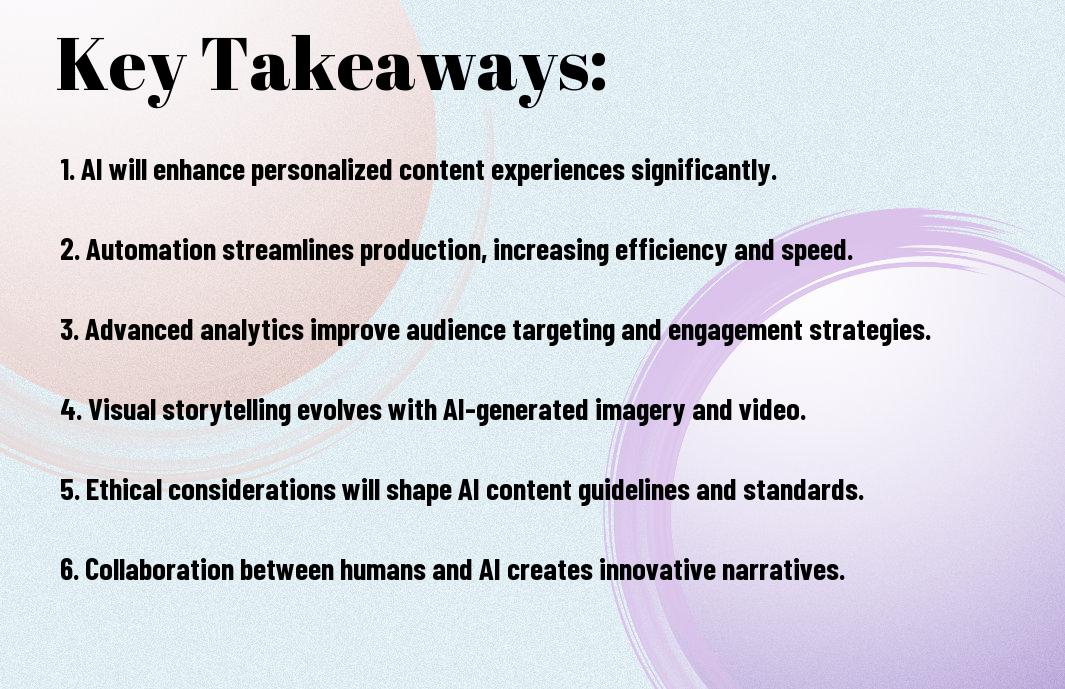

Emerging Trends in Content Creation
The landscape of content creation is rapidly evolving, influenced heavily by advancements in artificial intelligence. As you navigate these changes, it becomes imperative to stay informed about the latest Navigating the Future: AI Innovations in Content Creation. These trends are not only shaping how content is produced but also how it is consumed, offering a unique opportunity for creators to enhance their strategies and output.
Automated Content Generation
About automated content generation; it allows you to produce engaging articles, social media posts, and even video scripts with minimal human intervention. Tools leveraging natural language processing can create coherent and relevant content in a fraction of the time it would take you to do it manually. This technological capability enhances productivity while allowing you to focus on higher-level creative tasks.
Additionally, with the sharp increase in demand for content, these generating systems can help you maintain a steady flow of material for blogs, newsletters, and marketing campaigns. Though convenient, it is important to balance automated content with your unique voice to maintain authenticity and connect genuinely with your audience.
Personalization Through AI
Emerging technologies have made it easier than ever for you to personalize content for diverse audience segments. AI algorithms analyze data from user interactions, preferences, and demographics to create experiences tailored specifically to individual users. This degree of personalization leads to higher engagement rates and makes your audience feel understood and valued.
Hence, utilizing AI for personalization means you can streamline your marketing efforts and ensure that each piece of content resonates with its intended audience. By deploying targeted ads, customized recommendations, and personalized email communications, you significantly enhance user experience and drive customer loyalty.
Enhancing Creativity with AI Tools
Trends in AI are also influencing creativity in content creation. Innovative tools equipped with machine learning can assist you in brainstorming new ideas, generating unique visuals, and even composing music or sound effects that accompany your content. By integrating these tools, you can not only boost your creativity but also explore avenues that may have remained untapped in the past.
Furthermore, AI can act as a collaborator, providing feedback and suggestions that refine your work to enhance its impact. Leveraging these advancements allows you to experiment more and push the boundaries of your creative potential.
Enhancing creativity with AI tools opens a realm of possibilities for your projects. With AI as a creative partner, you can challenge traditional norms and explore innovative storytelling techniques, ultimately enriching your content creation process.
The Role of Natural Language Processing (NLP)
Unlike previous content creation methods that relied heavily on human intuition and manual effort, the advent of Natural Language Processing (NLP) brings a transformative impact on how content is generated, analyzed, and optimized. As AI technology evolves, you’ll find that NLP can significantly enhance the coherence and quality of the content you create. This shift enables content creators to focus on more strategic elements while allowing machines to handle repetitive and time-consuming tasks efficiently.
Advancements in NLP for Content Quality
On the frontier of AI, advancements in NLP are continuously improving the quality of content produced across various platforms. With the integration of machine learning algorithms, NLP tools can now analyze vast amounts of text to identify patterns, themes, and linguistic nuances that were previously challenging to detect. This enables you to craft content that is not just well-structured but also resonates more effectively with your target audience.
One significant advantage of modern NLP is the ability to provide real-time feedback on readability, tone, and even emotional impact. By leveraging NLP technologies, you can refine your writing process, ensuring that the content not only meets your expectations but also aligns with the preferences of your readers. This leads to increased engagement and a more profound connection with your audience, ultimately enhancing the success of your content strategy.
Applications of NLP in Different Content Types
Around the globe, NLP is being deployed across varied content types, offering tailored solutions for blogging, marketing, social media, and even academic writing. This versatility means that you can benefit from NLP tools regardless of the genre or format of your content. Whether you’re creating an engaging blog post, drafting a marketing email, or generating a social media update, NLP can streamline your process and refine your output for optimal results.
- Blogging: Enhanced writing assistance helps maintain reader engagement.
- Marketing: Automated analysis of customer sentiment shapes strategy.
- Social Media: Content tailored to trending topics boosts visibility.
- Academic Writing: Precise citation management and reference generation.
- News Articles: Automatic summarization aids in quickly crafting headlines.
After evaluating the specific use cases, you can see how NLP integrates seamlessly into your content workflows to improve efficiency and efficacy.
| Content Type | NLP Application |
| Blogging | Writing assistance and optimization |
| Marketing | Sentiment analysis and customer insights |
| Social Media | Trend analysis for timely posting |
| Academic Writing | Citation management tools |
| News Articles | Quick content summarization |
Challenges and Limitations of NLP
For all its benefits, the implementation of NLP in content creation is not without challenges. While advancements in AI have made NLP more sophisticated, there are still areas where it struggles—especially with understanding context, nuance, and cultural references. As a content creator, this may lead to situations where the technology misinterprets your message or produces content that does not fully capture the intended meaning. You must remain vigilant in reviewing and refining any machine-generated output.
Another significant limitation of NLP technology is its dependency on the quality of training data. If the data used to develop these models is biased or lacks diversity, you may encounter outputs that reflect these shortcomings. It is vital to engage with NLP tools critically and take responsibility for ensuring your content’s accuracy and quality. By combining human creativity with technological capabilities, you can harness the strengths of both while being mindful of their limitations.
Natural language processing undeniably presents both opportunities and challenges. As you integrate this technology into your content practices, it’s important to balance automation with personal insights to achieve the best possible outcomes. Be aware that while NLP can enhance your workflow, the need for human touch and discernment remains paramount.
The Impact of AI on Content Distribution
Many content creators are beginning to understand that the landscape of content distribution is changing dramatically due to advances in AI technologies. With these innovations, you can now reach your target audience more effectively than ever before. As AI continues to evolve, your strategies for promoting and disseminating your content will inevitably adapt. For a deeper probe this fascinating domain, check out the Future of AI-Generated Content – Potential of Chat GPT-4.
AI-Driven Content Recommendation Systems
Below, you will discover how AI-driven content recommendation systems have the power to enhance your content distribution. These systems analyze user behavior and preferences, allowing platforms to serve personalized content to their audiences. By leveraging these insights, you can significantly increase engagement rates, ensuring that your audience receives recommendations tailored specifically to their tastes. This leads not only to higher viewership but also fosters a deeper connection with your brand.
As you implement AI-driven recommendations, you create a more streamlined approach to content delivery, maximizing the potential of your efforts. With the right algorithms in play, your content has a better chance of reaching the right people at the right time, thereby boosting your overall effectiveness in the digital space.
Optimizing SEO with AI Insights
To effectively stand out in today’s crowded online landscape, utilizing AI insights for SEO optimization is a must. AI tools can analyze vast amounts of data to identify trends, keywords, and user interests that can help shape your content strategy. By understanding what audience segments are searching for, you can tailor your content to rank higher in search engines, driving traffic to your site.
Integrating AI into your SEO processes not only saves you time but also empowers you to make data-driven decisions. Instead of relying on intuition alone, you can leverage AI-generated insights to select keywords with high potential, analyze competition, and predict changes in user behavior that may impact your visibility. This proactive approach allows you to stay ahead in the dynamic world of content creation.
The Evolution of Social Media Algorithms
Optimizing your social media strategies requires an understanding of how social media algorithms have evolved through AI technologies. These algorithms are designed to curate content in ways that enhance user engagement and interaction. By grasping the nuances of these changes, you can position your content in front of the right audience on platforms that matter most to you.
The benefits of adapting to social media algorithm changes are substantial; you can find success in harnessing features like organic reach and targeted engagement, directing more traffic toward your content. As these platforms increasingly rely on sophisticated AI-driven models, understanding these shifts ensures that your content remains relevant and widely appreciated.
Social media continues to undergo changes as AI learns from user interactions and preferences. With every update, opportunities arise for enhanced visibility. By staying informed of these developments, you can continually refine your approach, adapting to algorithms that prioritize user satisfaction and engagement. This situational awareness will ultimately lead to a more effective distribution strategy.
Ethical Considerations in AI Content Creation
After exploring the fascinating advancements in AI-driven content creation, it’s imperative to investigate into the ethical considerations that accompany these technological innovations. As you navigate this evolving landscape, you should be aware of the implications of AI’s integration into your content strategies, particularly with regard to intellectual property, misinformation, and the need for transparency and accountability.
Intellectual Property Issues
An ongoing debate in AI content creation centers on intellectual property rights. When AI systems generate creative works, questions arise about who holds the rights to that content, and whether it infringes on existing copyrights. As a content creator, you might find yourself grappling with these issues, especially if your AI tools draw from a vast array of resources that include copyrighted materials. Understanding the legal landscape is vital to protect your work and the innovations brought forth by AI technologies.
Furthermore, considering the rapid pace of AI development, it is imperative for you to stay informed about changing legislation regarding AI-generated content. As guidelines evolve, it may impact how you use AI in your own creations, requiring you to consider potential future liabilities. Staying ahead of these changes is not only wise but necessary as you strive for originality and ownership in your content endeavors.
Misinformation and Deepfakes
Above the legal concerns sits a pressing ethical challenge—misinformation and deepfakes. With AI’s ability to create hyper-realistic content, the potential for misuse grows exponentially. You must be vigilant in your role as both a content creator and a consumer, as AI-generated misinformation can easily spread, damaging reputations and undermining public trust. The capacity for deepfakes can lead to serious societal implications, particularly in political contexts where fabricated information can influence public opinion and electoral outcomes.
To mitigate the risks associated with misinformation and deepfakes, it’s crucial for you to critically evaluate the sources of your information and the tools you utilize. Employing robust verification techniques and fostering a culture of responsible content consumption are imperative practices in combating the tide of misleading content. By doing so, you contribute to a more informed audience and a healthier media ecosystem.
The Importance of Transparency and Accountability
Among the ethical challenges facing AI content creators is the need for transparency and accountability. As you adopt AI tools, it’s important to disclose the use of such technologies in your content creation process. This not only builds trust with your audience but also fosters a culture of responsibility within the digital landscape. When your audience knows how content is generated, they are better equipped to critically assess it, which ultimately enhances their overall experience.
But the call for transparency doesn’t stop at disclosure; it extends to ensuring that the processes and algorithms behind AI-generated content are fair and unbiased. By actively engaging with these challenges and striving for clarity in your practices, you not only safeguard your credibility but also contribute to a more ethical future for content creation in the age of AI.
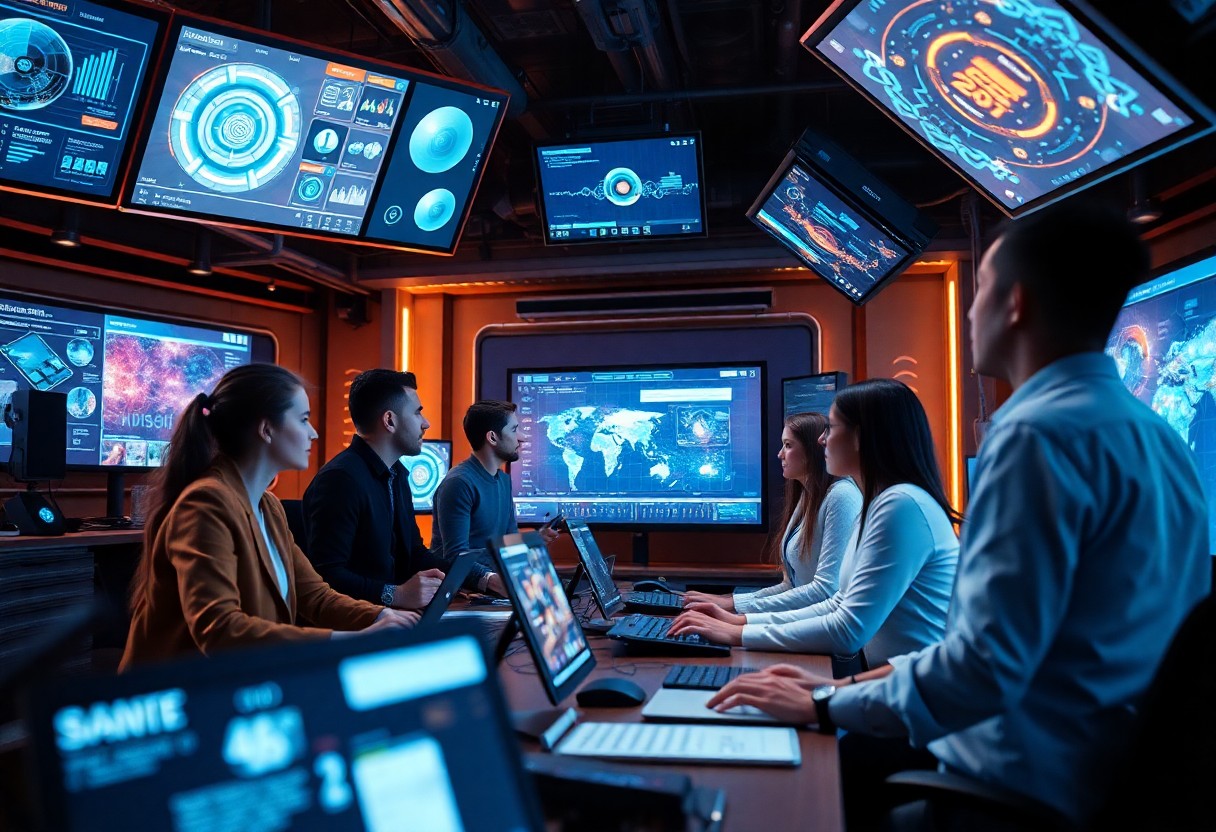
Case Studies of AI in Action
Once again, it’s necessary to examine real-world examples where AI has made significant strides in content creation. Below is a detailed list of impactful case studies that highlight the transformative role of AI in this space:
- The Washington Post: Utilizes the AI tool Heliograf to generate news articles, producing over 850 articles during the 2016 elections. The AI can generate concise, data-driven articles within seconds.
- BBC: Implemented AI-generated weather reports, significantly improving report production time. This allowed them to broadcast approximately 200k news stories more efficiently.
- Buzzfeed: Employed AI algorithms to analyze data trends and suggest content topics, resulting in a 30% increase in reader engagement for their articles created based on this data.
- Pandora: Developed Music Genome Project utilizing machine learning to personalize user experiences, which increased listener retention rate by 15%.
- Airbnb: Leverages AI to improve customer experience by generating personalized responses to over 4 million messages per week, enhancing user satisfaction metrics by 25%.
Successful AI Content Campaigns
Action-based campaigns that utilize AI technologies have shown remarkable success in enhancing marketing efforts. By leveraging automated content generation, brands can not only streamline their processes but also engage more effectively with their audiences. For instance, by using AI, companies can target specific demographics with highly tailored content, allowing for improved conversion rates and increased audience satisfaction.
The data from multiple campaigns illustrates that those who embraced AI saw an average increase of 15-20% in ROI when compared to traditional content strategies. This shift showcases how AI-driven campaigns not only generate efficient content but also adapt and refine their strategies on the fly, leading to continuously improving results.
Lessons Learned from AI Failures
On the flip side, your understanding of AI in content creation must also consider its failures. Mistakes made during AI implementation can often stem from a lack of clear objectives or improper data training. For example, numerous companies have suffered when their AI systems generated content that was off-brand or poorly aligned with their target market, resulting in negative audience reactions.
Exploring these lessons can offer you insights into what to avoid. Many businesses found that without proper oversight and human intervention, AI could produce content that inadvertently offended or confused audiences. Such scenarios underline the necessity of maintaining a balance between human creativity and AI efficiency.
At its core, these failures signal the importance of rigorous testing and continuous evaluation when integrating AI into your content creation strategy. Investing time and resources into building robust guidelines for AI systems can help in mitigating the potential pitfalls associated with their use and ensure they align with your brand message.
Insights from Industry Leaders
Learned from various industry leaders, the fusion of AI with content creation presents unprecedented opportunities for your business. Many experts assert that the future will be dominated by AI tools that can not only generate content but also analyze user preferences and trends. This feedback loop enhances creativity, allowing you to craft more engaging and relevant content that resonates with your audience.
Industry leaders consistently emphasize the significance of adaptive AI systems that evolve as audience trends shift. Due to this adaptability, your campaigns can remain fresh and maintain audience engagement over longer periods. Moreover, the analyses these leaders conducted showed that companies implementing adaptive AI saw a marked improvement in customer loyalty and engagement metrics.
Due to increased reliance on sophisticated AI solutions, it has become apparent that investing in education and training around these technologies is necessary for your workforce. Developing a deep understanding of AI capabilities will empower you to use them effectively, enhancing your content strategy and ultimately benefitting your audience engagement.
To Wrap Up
Upon reflecting on the evolution of content creation, it is clear that AI innovations are set to revolutionize the way you approach content. From automated writing tools that can generate blog posts in a matter of minutes to AI-driven design software that can create stunning visuals without the need for extensive design knowledge, the possibilities are expanding rapidly. You can expect that these advancements will not only save you time and effort but also enhance your creative processes, allowing you to focus on what really matters: connecting with your audience and delivering value.
As you look towards the future, staying updated on these innovations will be crucial for maintaining a competitive edge. Embracing AI technology can empower you to create more engaging and personalized content that resonates with your viewers. You will find that the integration of AI tools into your workflow can lead to stronger data insights, improved audience targeting, and a more dynamic range of content formats. By leveraging these advancements, you position yourself not just as a content creator but as a forward-thinking marketer ready to capture the attention of a continually evolving digital landscape.
FAQ
Q: What are some anticipated AI innovations in content creation?
A: Some notable AI innovations expected in content creation include advanced natural language generation tools that can produce high-quality written content with minimal input, AI-driven video editing software that can automatically compile highlights or create engaging visuals, and machine learning algorithms that analyze audience preferences to personalize content in real time. Additionally, AI is expected to enhance SEO strategies, allowing creators to produce content that ranks higher on search engines through smart keyword analysis.
Q: How will AI impact the role of content creators?
A: The role of content creators will evolve with AI assistance. While AI tools can take care of repetitive tasks, such as data analysis or basic content generation, creators will be able to focus more on strategy, creativity, and emotional engagement. This shift may lead to a new type of collaboration between human skills and AI technology, resulting in richer and more diverse content outputs.
Q: Will AI-generated content be of high quality and originality?
A: AI-generated content is expected to reach impressive levels of quality and originality due to ongoing advancements in machine learning and deep learning algorithms. With improved capabilities, AI can learn from vast amounts of data to produce coherent and sometimes even compelling narratives. However, the effectiveness still depends on the prompts and training data provided, emphasizing the importance of human oversight to ensure nuance and creativity in the final product.
Q: How can businesses leverage AI in their content marketing strategies?
A: Businesses can leverage AI by integrating tools that perform audience analysis, sentiment tracking, and performance monitoring of content. AI can help identify trending topics, suggest creative ideas, and optimize distribution strategies to reach the right audience effectively. Additionally, AI chatbots can enhance customer engagement by providing immediate assistance and personalized content recommendations, ultimately supporting marketing efforts.
Q: What ethical considerations should be taken into account with AI in content creation?
A: As AI takes on a larger role in content creation, ethical considerations become significant. Issues include the potential for plagiarism, the transparency of AI-generated work, and the responsibility of creators to acknowledge AI’s role. It’s imperative to consider the authenticity of messaging and the potential for misinformation. Moreover, there should be guidelines in place to regulate the use of AI in content creation to avoid biases and ensure fair representation in media.
Unlocking Success: How AI is Shaping the Future of SEO and Essential Strategies to Adapt
This guide will empower you to unlock success in your digital marketing efforts as you navigate the transformative impact of AI on SEO. With search algorithms evolving to prioritize user intent and personalization, it’s important for you to adapt your strategies accordingly. You’ll discover how AI can enhance your content creation, optimize your keywords, and automate key tasks, ensuring you stay ahead in an increasingly competitive landscape. Prepare to implement these important strategies and watch your search engine rankings soar as you harness the power of AI.
Key Takeaways:
- AI-Powered Algorithms: AI is revolutionizing SEO through advanced algorithms that enhance search result accuracy and personalization, shifting focus from mere keyword matching to understanding user intent.
- Content Creation Efficiency: Generative AI tools streamline the content creation process by automating tasks, which saves time and boosts content quality, but human creativity remains integral to making content relatable and engaging.
- Balancing Human Touch and AI: A successful SEO strategy blends human expertise with AI capabilities to ensure content resonates with users while leveraging data analytics for improved SEO performance.
- Focus on User Intent: Emphasizing user intent in content strategy, such as understanding the distinction between informational and transactional queries, ensures that content effectively meets audience needs at all stages of the user journey.
- Regular Strategy Updates: SEO is an ongoing process; continuously refining your approach using AI-driven insights and performance metrics is key to staying relevant in an evolving digital landscape.
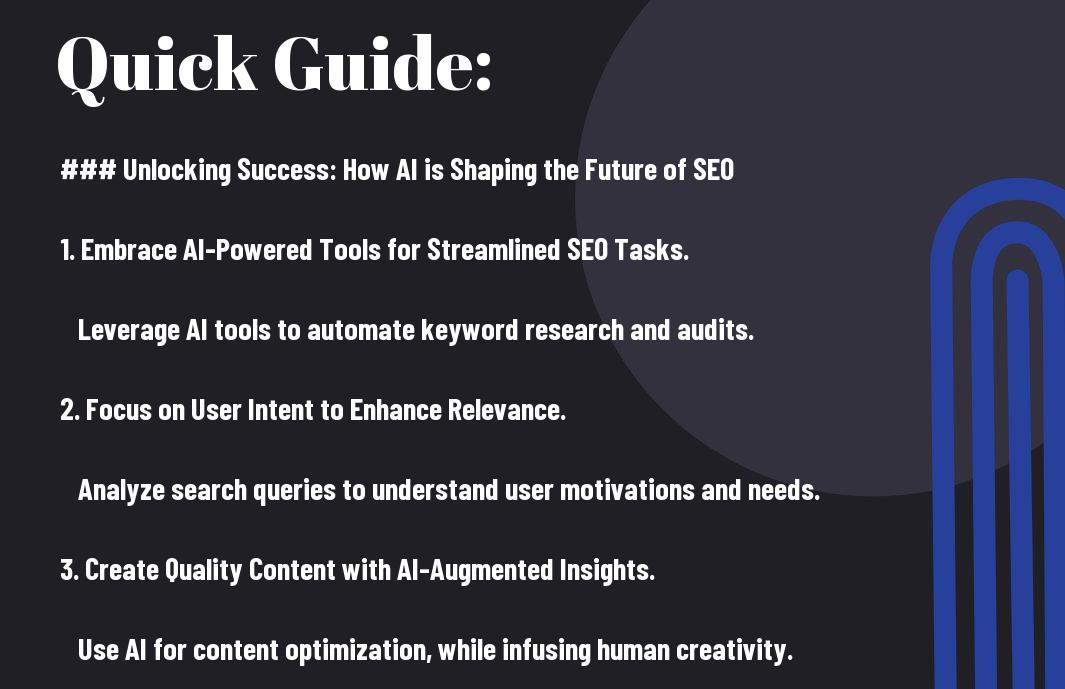
The Types of AI in SEO
While exploring the dynamic landscape of SEO, it’s necessary to understand the various types of AI technologies reshaping strategies and enhancing performance. These AI technologies play a pivotal role in making SEO more efficient, allowing you to leverage their capabilities for better visibility and user engagement. Here are some key types of AI utilized in the SEO realm:
| Type of AI | Description |
| AI-Powered Algorithms | Algorithms that utilize machine learning to provide more relevant search results based on user intent. |
| Generative AI | AI models that create content, enhancing both the quality and efficiency of your content strategy. |
| Predictive Analytics | AI tools that analyze data patterns to forecast user behavior, enabling targeted marketing efforts. |
| Natural Language Processing | AI that understands and interprets human language, refining keyword strategies and content relevance. |
| Chatbots | Automated communication tools that enhance user interaction on your site, improving user experiences. |
The growing influence of AI in your SEO strategies not only enhances efficiency but also tailors the user experience, making your approach to content creation and optimization more effective.
AI-Powered Algorithms
Algorithms have fundamentally changed the SEO landscape, transitioning from simple keyword matching to sophisticated systems that comprehend user intent. With tools like Google’s RankBrain, these algorithms analyze vast amounts of data to present search results that are not only relevant but also personalized based on user behavior and preferences. This shift means you must adapt your SEO tactics to align with these advanced algorithms, focusing on the contextual relevance of your content.
Moreover, the need for quality content tailored to specific user needs is paramount. As algorithms become increasingly adept at interpreting semantic search, your content strategy should shift towards creating content that resonates with your audience’s questions and intentions. Utilizing AI-powered tools can help you refine your approach by providing insights into user behavior and content performance.
Generative AI for Content Creation
Types of generative AI have revolutionized the way you approach content creation, enabling faster production without compromising quality. This technology can analyze trending topics, user queries, and effective formats to generate optimized content that aligns with SEO best practices. By saving you time and effort, generative AI allows you to focus on higher-level strategy and creative output, adding value to your overall content plan.
It’s important to recognize that while generative AI can significantly enhance content efficiency and quality, there exists the potential risk of sacrificing authenticity in favor of automation. Thus, while using AI for content generation is immensely beneficial, you must ensure that your unique voice and perspective remain evident in your content. This balance between automation and human creativity is necessary for fostering strong connections with your audience, leading to improved engagement and ultimately better SEO performance.

Key Factors Influencing SEO in the AI Era
Some of the key factors influencing SEO in the AI era revolve around understanding user intent, enhancing personalization, and leveraging AI-driven tools. These elements can fundamentally transform your approach to SEO by ensuring that your content resonates with the evolving needs of your audience. Here are some critical factors to consider:
- Understanding user intent and behavior
- Implementing strategies focused on personalization
- Utilizing AI-driven tools for optimization
- Engaging in comprehensive keyword research
- Regularly updating your content strategy based on data
After embracing these strategies, you will enhance your visibility and effectiveness in the competitive digital landscape. For a deeper insight into how to adapt your strategies to the influence of AI, check out AI Is Driving The Future Of SEO: How To Adapt.
User Intent
Many businesses underestimate the importance of user intent in influencing their SEO strategies. It’s not just about finding popular keywords; you must also consider the underlying intention behind those keywords. By conducting a thorough analysis, you can tailor your content to meet the specific needs of your audience, whether they are seeking information, making a purchase, or searching for answers to specific questions.
Recognizing informational versus transactional queries can dramatically enhance your site’s relevance in search results. By honing in on user intent, you can attract not just any traffic, but the right traffic that better aligns with your goals, ultimately leading to higher conversion rates.
Personalization
For effective SEO in the AI era, harnessing personalization can significantly enhance user engagement and satisfaction. Tailoring your content according to the unique preferences and behaviors of your audience fosters a deeper connection and increases the likelihood of conversion. This means you should utilize data analytics to understand who your audience is, what they like, and how they behave across different touchpoints. In doing so, you can create tailored content that speaks directly to their interests.
Understanding the intricate relationship between personalization and user experience is vital. By crafting highly personalized experiences that meet user demands, you build trust and encourage repeat interactions. As a result, you can see positive outcomes such as increased website traffic, improved engagement metrics, and better SEO performance, boosting your overall digital marketing strategy.

Pros and Cons of AI in SEO
Due to the evolving digital landscape, many businesses are increasingly incorporating artificial intelligence into their SEO strategies. However, it is imperative to weigh the pros and cons of doing so. The adoption of AI in SEO presents numerous opportunities for growth and efficiency, but it also comes with challenges that require careful consideration. Below is a breakdown of the positive and negative aspects of integrating AI into your SEO efforts:
| Pros | Cons |
|---|---|
| Enhances search result accuracy through machine learning. | May lead to over-reliance on technology, diminishing human creativity. |
| Improves personalization and user experience. | AI may misinterpret user intent without proper context. |
| Automates time-consuming SEO tasks, saving time and resources. | Can generate content that lacks emotional depth and engagement. |
| Identifies high-potential keywords and content opportunities. | Quality control may suffer if AI-generated content is not reviewed. |
| Allows for continuous data analysis to inform strategies. | Potential for biased or inaccurate data interpretation. |
| Facilitates better tracking of performance metrics. | Requires ongoing adjustments and updates as algorithms evolve. |
| Boosts productivity by streamlining various SEO processes. | May increase competition as AI tools become more accessible. |
| Enables faster decision-making based on real-time data. | Risk of overlooking important niche factors unique to your audience. |
| Improves content optimization for specific demographics. | Learning curve associated with effectively using AI tools. |
Advantages of AI Integration
For marketers like you, integrating AI into your SEO strategy can yield significant advantages. One of the most notable benefits is the ability to enhance search result accuracy through machine learning algorithms, such as Google’s RankBrain. These algorithms analyze vast amounts of data to understand user intent better, allowing you to deliver content that meets users’ needs effectively. By doing so, you not only enhance the user experience but also improve your chances of achieving higher search rankings.
Moreover, AI can automate repetitive tasks, enabling you to focus on more strategic elements of your SEO plan. By using AI-driven tools for keyword research and content optimization, you can uncover high-potential long-tail keywords that align with user intent. This approach ensures that your content not only satisfies the search engine algorithms but also resonates with your target audience. Ultimately, the integration of AI can lead to improved efficiency and effectiveness in your SEO efforts.
Challenges and Limitations
On the other hand, relying on AI in your SEO strategy introduces several challenges and limitations you should be aware of. While automation can save time, it may also result in content that lacks emotional depth, ultimately alienating users. Furthermore, AI algorithms operate based on data analysis—if this data is flawed or not representative of your target audience, the insights generated may lead you down the wrong path. This necessity for accurate, high-quality data cannot be overstated, as it directly influences the effectiveness of your SEO strategies.
The dynamic nature of AI technologies also means that you must stay informed about ongoing changes and updates to algorithms in order to maintain effectiveness. The learning curve associated with effectively utilizing AI tools can pose a significant hurdle for businesses new to this technology. Finally, the potential for bias in AI-generated insights could inadvertently skew your content strategy, leading to missed opportunities that cater to your unique audience needs. By assessing these challenges, you can develop a more balanced approach that leverages the strengths of AI while mitigating its pitfalls.
Step-by-Step Strategies for Adapting SEO
Now, as the dynamics of SEO continue to shift with the rise of artificial intelligence, it’s important for you to adapt your strategies accordingly. By developing a clear approach, you can leverage AI to enhance your SEO efforts while maintaining the human touch that resonates with your audience. Below is a structured guide that highlights effective strategies for successful adaptation:
| Strategy | Description |
| Conduct Regular SEO Audits | Use AI-driven tools to perform comprehensive audits of your website, identifying technical issues and optimization opportunities. |
| Keyword Research with AI | Utilize AI tools to discover relevant, user-intent-focused keywords, which can drive organic traffic. |
| Content Creation and Updates | Leverage generative AI for content creation while ensuring human creativity adds value and engagement. |
| Focus on User Intent | Analyze user behavior and customize your content to align with various stages of their journey. |
For deeper insights on how to navigate this transition successfully, check out this How AI will revolutionize the future of SEO.
Embracing AI Tools
One of the most effective ways for you to adapt your SEO strategy is by embracing AI tools that automate and optimize tasks. These tools can significantly enhance your efficiency by analyzing data and offering actionable insights tailored to your specific needs. Start with a comprehensive site audit to pinpoint any technical issues that may hinder your performance. Addressing these areas will ensure that your website is fully optimized for AI-driven algorithms that prioritize user experience.
Additionally, integrating AI tools into your keyword research will allow you to identify both high-potential long-tail keywords and those utilized by your competitors. As a result, you can create content that not only meets the requirements of search engines but also resonates with users. Regularly updating your strategies based on AI insights will ensure your content remains relevant in this rapidly changing landscape.
Content Optimization Techniques
Optimization is key to enhancing your SEO performance in the age of AI. Focus your efforts on improving the quality and relevance of your content through ongoing assessments and updates. Implement strategies such as optimizing titles, meta descriptions, and headings to better align with user search intent. Additionally, use AI tools to analyze your content structure and identify areas for improvement, helping you create informative and engaging material.
For instance, utilizing AI-powered analytics allows you to track user engagement and determine which pieces of content are driving traffic and conversions. This valuable data can direct you to refine existing content or create new pieces that cater to your audience’s evolving needs. By regularly adapting and enhancing your content strategy, you not only improve your chances of ranking higher on search engines but also foster trust and loyalty among your audience.
Tips for Balancing AI and Human Expertise
Once again, finding the right equilibrium between AI tools and human expertise is crucial for a successful SEO strategy. To achieve this balance, consider the following tips:
- Emphasize the role of human creativity in content creation.
- Utilize data-driven insights from AI tools while incorporating your unique voice.
- Integrate personalization strategies driven by user intent.
- Regularly review performance metrics to identify areas where human input enhances AI efficiency.
This method not only utilizes the strengths of AI but also encapsulates the distinctiveness that only human expertise can provide. For further insights, check out Unlocking the Potential: How AI is Transforming SEO Strategies for Businesses.
Leveraging Human Creativity
On the path to augmenting your SEO strategies, the importance of human creativity cannot be understated. While AI excels in sifting through vast amounts of data and identifying trends, it lacks the personal touch that engages users. You can utilize AI-generated content as a foundation but should always infuse your work with storytelling, emotional resonance, and an authentic voice. Doing so not only helps your content stand out but also fosters a genuine connection with your audience, which can significantly enhance user engagement and trust.
On top of that, harnessing human creativity allows for unique viewpoints that resonate with niche audiences. For instance, while AI can highlight trending topics, your individual insights and perspectives can transform generic information into compelling, valuable content that appeals to your target demographic. By synergizing AI’s capabilities with your creative instincts, you can craft a rewarding SEO strategy that stands out in a crowded marketplace.
Data-Driven Insights
On your journey to mastering SEO in the AI era, using data-driven insights is crucial for effective decision-making. AI tools offer an abundance of analytical capabilities, enabling you to examine user behavior, keyword effectiveness, and engagement metrics in real-time. By diving deep into the data, you can uncover meaningful patterns that inform your content optimization and marketing strategies. This insight allows you to tailor your approach based on what your audience truly seeks, ensuring that your content resonates well with their needs.
Plus, creating an effective SEO strategy heavily relies on leveraging these insights. Regular audits of your site’s performance, keyword analysis, and engagement metrics can reveal significant opportunities for improvement. With an emphasis on long-tail keywords and understanding user intent, you can prioritize producing content that not only aligns with search engine algorithms but also appeals to users’ necessities and preferences. This iterative process keeps you adaptable and ensures that your SEO efforts remain relevant and impactful.

Evolving Your SEO Strategy
Not all SEO strategies will remain effective in the ever-evolving digital landscape driven by AI. To stay competitive, you must proactively adapt your approach based on the latest advancements and insights. Integrating AI-driven tools into your SEO strategy enables you to automate repetitive tasks, enhance your keyword research, and optimize your content creation processes. By leveraging data analytics, you can better understand your audience’s behavior and preferences, allowing you to create content that genuinely resonates with them. This shift addresses the modernization of search algorithms, which prioritize user intent and content relevance over simple keyword matching.
Regular Monitoring and Adjustments
Even in an AI-enhanced SEO landscape, the importance of regular monitoring and adjustments cannot be overstated. Continuous evaluation of your website’s performance metrics, including organic traffic, bounce rates, and conversion rates, will provide valuable insights into what is working and what isn’t. By analyzing these metrics with AI tools, you can identify trends and make data-driven decisions to refine your strategies effectively. This iterative approach not only enables you to tune your content but also ensures that you remain aligned with evolving user expectations and search engine ranking criteria.
Future Proofing Your SEO Efforts
Proofing your SEO efforts for the future involves a multi-faceted approach that anticipates changes in technology, user behavior, and search engines’ ranking algorithms. It is imperative to remain adaptable and stay informed of emerging trends, such as voice search optimization and the growing significance of video content. You can position your website for sustainable growth by prioritizing a user-friendly experience and focusing on high-quality content that addresses specific user needs. Additionally, keeping your website optimized for mobile devices and leveraging social media as a distribution channel can significantly augment your visibility and engagement.
For instance, investing in tools that automate technical SEO assessments can help you identify and resolve issues like broken links or slow page speeds immediately. These aspects are vital since a well-optimized website contributes not only to improved rankings but also enhances user experience. By embracing AI insights, refining your keyword research to align with user intent, and crafting tailored content that addresses your audience’s pain points, you actively protect and enhance your online presence against the shifting tides of digital marketing.
Unlocking Success: How AI is Shaping the Future of SEO and Essential Strategies to Adapt
Summing up, AI is not merely an accessory in your SEO toolkit; it is becoming the cornerstone that shapes effective strategies in digital marketing. As user behavior evolves and search engines increasingly leverage AI for more refined results, your approach to SEO must reflect a commitment to understanding user intent and maximizing personalization. By incorporating AI-driven tools, you can elevate your keyword research, optimize your content quality, and analyze competition, thereby increasing your chances of ranking well even without prior domain authority. The future success of your website hinges on your ability to blend the power of artificial intelligence with your unique human insights.
To navigate this AI-driven landscape successfully, focus on enhancing user experience through tailored content that speaks directly to your audience’s needs and preferences. Actively engage in consumer feedback loops to refine your strategies continually and leverage analytical insights to stay relevant. By embracing AI’s capabilities while showcasing your own creativity and understanding of your audience, you position your website for success in a competitive digital environment. This balanced approach not only boosts your search rankings but also fosters trust and loyalty among your users, ensuring sustainable growth in the ever-evolving world of SEO.
FAQ
Q1: How is artificial intelligence transforming SEO strategies?
A1: Artificial intelligence is increasingly influencing SEO strategies by enabling search algorithms to understand user intent more comprehensively. This shift from simple keyword matching to semantic search allows search engines to deliver more relevant results based on context, user behavior, and preferences. As a result, SEO strategies must focus more on engaging content that aligns with user queries, taking into consideration the nuances of language and intent.
Q2: What role does AI play in content creation for SEO?
A2: AI plays a significant role in enhancing content creation for SEO by automating tasks such as keyword research and content optimization. Generative AI can assist in producing high-quality, relevant content efficiently. However, human creativity is still vital for crafting unique and engaging narratives that resonate with users. Balancing AI-generated content with human touch creates a more compelling and relatable user experience, vital for successful SEO.
Q3: How can businesses adapt their SEO strategies to leverage AI effectively?
A3: Businesses can adapt their SEO strategies by incorporating AI-driven tools to automate tasks like site audits, keyword discovery, and content optimization. It’s also important to focus on user intent and personalization by analyzing keywords not only for volume but also for their underlying intent. Mapping the user journey can help businesses identify the appropriate content for each stage, leading to a more targeted and effective SEO strategy that aligns with user expectations.
Q4: What are the key factors to consider when focusing on user intent in SEO?
A4: When focusing on user intent in SEO, it’s vital to analyze keywords in the context of user questions and needs. Understanding whether keywords relate to informational, navigational, or transactional queries helps shape content that meets user expectations. Additionally, utilizing AI tools for behavioral analysis can provide insights into user interactions with your content, allowing continuous refinement of your SEO strategy based on actual data and feedback.
Q5: What ongoing practices should be implemented for maintaining an effective AI-driven SEO strategy?
A5: To maintain an effective AI-driven SEO strategy, businesses should regularly audit their websites for technical issues, optimize content based on current keyword insights, and analyze backlink profiles. Monitoring performance metrics is crucial for understanding what’s working and what isn’t. In addition, keeping up-to-date with AI advancements will help adapt strategies to emerging trends in user behavior and search engine algorithms, ensuring long-term success in the evolving SEO landscape.
Content Optimization in the Age of AI: 2025 Best Practices
AI is transforming content optimization, making it vital for you to understand the best practices for AI-powered SEO in 2025. As you navigate this evolving landscape, embracing AI content optimization tools and strategies will enhance your ability to connect with your audience. This guide will provide you with actionable insights on content optimization best practices, including voice search optimization, user experience metrics, and adherence to E-E-A-T principles. Equip yourself with the latest trends and tools to ensure your content remains relevant and impactful in the future of digital marketing.
Key Takeaways:
- AI content optimization is transforming the way businesses approach their digital strategies, leading to the creation of more relevant and engaging content.
- As we move towards AI SEO 2025, incorporating E-E-A-T principles (Expertise, Authoritativeness, Trustworthiness) will be vital for improving search rankings and user trust.
- Adopting content optimization tools that leverage AI technology will facilitate efficient analysis and enhancement of content strategies, allowing businesses to stay competitive.
- To enhance visibility, integrating voice search optimization techniques and focusing on mobile-first optimization will be necessary as user behaviors continue to shift.
- Understanding search intent categories—from informational to transactional—will inform content development and help align strategies with user expectations.
Understanding Content Optimization
While many marketers utilize various techniques, the fundamental essence of content optimization involves refining your content to boost its visibility and effectiveness in search engines. This process not only involves the use of relevant keywords but also focuses on enhancing user experience by providing valuable, engaging, and informative content. A thorough understanding of Content Optimization with AI: 10 Effective Approaches (2025) can help you stay ahead in the digital landscape.
Definition and Importance of Content Optimization
Beside improving search rankings, content optimization is about aligning your content with user intent and behavior. It is an ongoing strategy that involves updating and refining your textual and visual elements to maximize engagement metrics like click-through rates and time on page. As search engines evolve, the tactics you employ must also adapt to maintain relevance, ensuring that your audiences find what they’re looking for in an increasingly crowded digital marketplace.
Furthermore, content optimization facilitates a deeper connection with your audience by fostering trust and authority around your brand. By focusing on creating high-quality content that adheres to the E-E-A-T principles (Expertise, Authoritativeness, and Trustworthiness), you enhance not only your SEO performance but also the overall perception of your brand in the eyes of potential customers.
The Role of AI in Modern Content Strategies
An integration of AI-powered tools enhances your ability to develop content that resonates with your audience. With initiatives such as AI content optimization, you can analyze user behavior, predict trends, and tailor your content strategy to match emerging technologies and search patterns. This evolution towards AI-powered SEO empowers marketers to deliver highly relevant content efficiently—shaping your approach to meet the demands of 2025 and beyond.
Due to the rapid advancements in AI, you now have access to an array of content optimization tools that assist in refining your strategies. These tools aid in voice search optimization and mobile-first design, ensuring that your content is easily discoverable and engaging across various platforms. By leveraging these technologies, you position yourself at the forefront of the changing digital landscape, effectively addressing user needs and preferences in real-time.
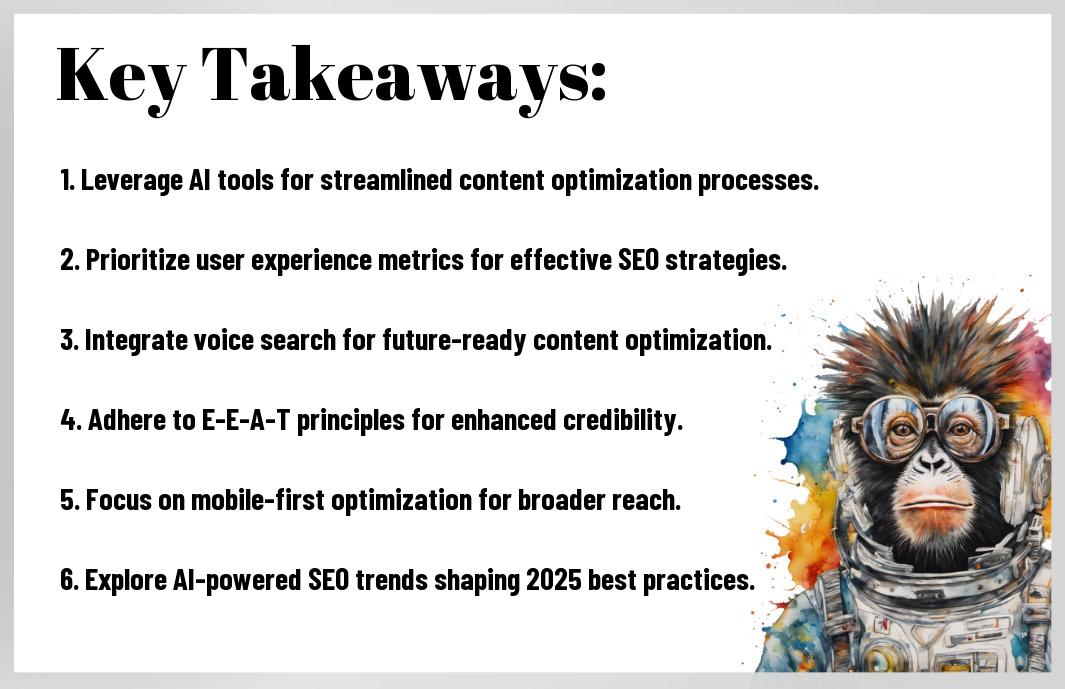

Key AI Technologies Shaping Content Optimization
Now is the time to understand how AI technologies are revolutionizing content optimization. As we move towards AI SEO 2025, adopting the right tools and strategies can significantly enhance your content’s performance. Among the key technologies leading this evolution are Natural Language Processing (NLP), Machine Learning Algorithms, and Predictive Analytics.
Natural Language Processing (NLP)
Above all, Natural Language Processing (NLP) enables machines to understand and interpret human language, making it a pivotal component in AI content optimization. By analyzing text, sentiments, and syntax, NLP tools help you create content that resonates with your audience while adhering to search engine requirements. This synergy between human touch and machine efficiency enhances the overall user experience, making your content more relatable and easier to discover.
Furthermore, as the landscape evolves, leveraging NLP can help you optimize for voice search and conversational queries better. Given that voice search increasingly influences SEO practices, applying NLP effectively ensures your content aligns with changing search dynamics, solidifying its relevance in AI-powered SEO.
Machine Learning Algorithms
With advances in Machine Learning Algorithms, you can now automate and refine your content optimization processes. These algorithms analyze vast amounts of data, identifying patterns and trends that inform your content choices. By utilizing these insights, you can tailor your content strategies to match audience preferences, enhancing engagement and visibility.
It’s important to note that these algorithms continuously learn from user interactions. As you refine your content optimizations over time, the machine learning model becomes increasingly adept at predicting what type of content will resonate best with your audience, ultimately improving your search rankings.
Predictive Analytics
To gain a competitive edge in content optimization, Predictive Analytics equips you with data-driven insights that forecast content performance. By analyzing historical data and user behavior, you can anticipate future trends and adjust your strategies accordingly. This proactive approach to content creation not only helps in aligning with user intent but also ensures that you stay ahead of the curve in the ever-evolving landscape of content optimization best practices.
And the ability of predictive analytics to offer actionable insights allows you to make informed decisions about your content development and distribution. By leveraging content optimization tools that utilize predictive analytics, you position your content to adapt effectively to user needs while ensuring it remains relevant in AI content optimization discussions moving into 2025 and beyond.
Best Practices for AI-Driven Content Optimization
Unlike traditional methods, AI-driven content optimization offers a dynamic approach to enhancing your digital presence in 2025. The integration of AI content optimization tools allows you to refine your content strategy significantly. Understanding how to leverage these tools effectively can differentiate your brand in a competitive landscape. AI-powered SEO helps you identify trends, automate repetitive tasks, and tailor your content to meet specific audience needs.
Integrating AI Tools into Content Strategy
Any content strategy you implement should consider incorporating AI content optimization tools to streamline processes and enhance performance. These tools allow for real-time analysis of user engagement, helping you make informed decisions based on data-driven insights. By integrating AI SEO best practices, such as keyword optimization and content recommendations, you can ensure your content is not only relevant but also positioned to rank well in search engines.
Moreover, by melding AI capabilities with your creative processes, you open avenues for generating content that resonates with your audience. As you explore the best practices for AI-driven content optimization, consider how your AI tools can facilitate collaboration between data insights and human creativity.
Leveraging User Data for Personalization
An effective way to optimize your content is by harnessing user data to drive personalization. This approach involves analyzing user behavior, demographics, and feedback to create tailored experiences that resonate with your audience. By understanding user intent, you can craft content that not only fulfills their needs but also aligns with their search queries and preferences. As you aim for E-E-A-T principles, ensuring expertise and trustworthiness through personalized content can significantly enhance user engagement.
Also, integrating AI-powered analytics can help you uncover trends in user behavior that are pivotal for effective content optimization strategies. These insights empower you to adjust your content to better meet audience needs, thus improving overall engagement and conversion rates.
Enhancing Readability and Engagement
AIDriven content optimization focuses heavily on readability and engagement metrics. It’s vital to create content that is not only informative but also engaging for your readers. Implementing AI tools that assess readability can guide your writing style, ensuring that your content is accessible to a broader audience. Mobile-first optimization plays a role here, as more users access content via mobile devices, necessitating a clear and concise content structure.
Practices such as incorporating bullet points, headers, and visuals can enhance user experience, making your content more digestible. These elements, combined with AI-driven insights on user engagement, allow you to continuously refine your approach, ensuring you are meeting your audience’s needs effectively.

E-E-A-T Principles in Content Creation
Keep in mind that E-E-A-T stands for Expertise, Authoritativeness, and Trustworthiness, and is a significant framework recognized by search engines like Google to assess the quality of content. Understanding these principles is important for you as you navigate the evolving landscape of AI content optimization and prepare for AI SEO 2025. The concept of E-E-A-T encourages you to establish your credibility and that of your content, which can ultimately influence your rankings. To create content that meets these standards, you should focus on providing in-depth, accurate information that reflects a deep understanding of your topic, thereby enhancing your content optimization strategies.
Understanding Expertise, Authoritativeness, and Trustworthiness
Principles of E-E-A-T guide you in creating content that resonates with both your audience and search engines. Expertise refers to your deep knowledge of the subject matter, authoritativeness reflects your reputation within your domain, and trustworthiness is about ensuring that your website and content can be relied upon for accurate information. When you produce content that showcases these attributes, it fosters a strong relationship with your audience, making them more likely to consider you a go-to source for content optimization best practices. Furthermore, leveraging AI-powered SEO tools can help you identify keywords and optimize your content effectively.
The Role of Experience in Content Quality
Along with E-E-A-T principles, the role of experience plays a pivotal part in enhancing content quality. It’s important for you to draw on your personal or organizational experience in your field when crafting content. Sharing anecdotes, case studies, or insights based on firsthand knowledge can greatly enrich your content and provide added value to your readers. When they see you sharing your experiences, they are more inclined to trust your insights and advice, thus improving your overall content optimization efforts.
Considering the landscape of content creation is rapidly evolving, integrating personal experiences and insights into your content can set you apart from competitors. You should also utilize content optimization tools that align with AI content optimization trends to maximize the value you provide. By doing so, you not only contribute to the future of content optimization, but you also ensure that your content remains relevant, engaging, and valuable in the face of increasing competition in voice search and mobile-first optimization.
Content Optimization Tools for 2025
For marketers looking to thrive in the digital landscape of 2025, understanding the AI content optimization landscape is important. The integration of AI-powered tools has transformed how you approach content creation, making it easier to optimize for search engines and improve user engagement. As you consider incorporating AI into your strategy, you can find valuable insights in the article AI and the Future of SEO: How SMBs Can Thrive in 2025. This resource explores the most effective tools and techniques to stay ahead in the ever-evolving SEO landscape.
Overview of Popular AI Tools
Across numerous platforms, a variety of AI content optimization tools are available, each designed to cater to specific needs. Tools like Clearscope and Surfer SEO can help you fine-tune your content to align more closely with search intent by providing keyword suggestions and content scoring based on what top-ranking articles currently use. These tools’ capabilities can significantly enhance your content strategies, ensuring that you are utilizing the best available data to inform your SEO practices.
Another popular option is MarketMuse, which employs AI to perform content audits and identify gaps that could be filled with new content. This tool emphasizes the importance of user experience metrics and mobile-first optimization, aligning your efforts with E-E-A-T principles (Expertise, Authoritativeness, Trustworthiness) vital for Google’s ranking algorithm.
Evaluating Tools Based on Features and Pricing
An effective evaluation of content optimization tools involves looking closely at their features, pricing, and how well they accommodate your specific needs. Some tools may offer comprehensive features for a higher price, while others might focus on niche capabilities at a lower cost. It’s important to analyze the value provided by each tool. This analysis enables you to choose the right solution that fits your budget while delivering the required functionality.
Indeed, while exploring AI content optimization tools in 2025, you will encounter options tailored for both small businesses and large enterprises. Your budget may influence your choice, but the potential return on investment should always be a priority. Assessing the competitive landscape of tools will allow you to understand which features might be important and which may be expendable, ensuring you only pay for what genuinely adds value to your strategy.
Future Trends in Optimization Tools
Against the backdrop of evolving technology, the future of content optimization tools is expected to focus heavily on voice search optimization and advanced AI capabilities that enhance user experience. As voice search continues to rise, tools will increasingly help you create content tailored for conversational keywords and queries. This trend will necessitate a fresh approach to your content strategies to stay relevant and discoverable in search results.
Pricing models are also likely to change in response to user demand for more flexible and scalable solutions. Subscription-based platforms may integrate pay-per-use features that allow you to select services on an as-needed basis, maximizing efficiency in your budget allocation. Keeping an eye on these trends will enable you to adapt more swiftly, ensuring your SEO practices remain effective even as the landscape shifts.
Adapting to Search Intent and Behavior
After recognizing the shifting landscape of digital marketing, it is necessary to understand the various dimensions of search intent to effectively engage your audience. This involves not only grasping what users seek at different stages of their journey but also how you can cater your content to meet these specific needs. By doing so, you will enhance your chances of boosting rankings and driving conversions.
Identifying Search Intent Types
Behind every query lies an intention, comprising various categories that guide how you approach AI content optimization for maximum effectiveness. Common search intent types include:
| Informational | Users are seeking knowledge or answers (how-to guides). |
| Commercial | Searchers are comparing tools or services to make purchasing decisions. |
| Navigational | Users are looking for specific best practices or recognizable brands. |
| Transactional | Search queries focused on purchasing or downloading content optimization tools. |
| Local | Users are seeking local services or products relevant to their location. |
Thou must ensure that your content aligns with these intent types to continue developing effective content optimization strategies.
Crafting Content for Different Audience Segments
Adapting your content approach to various audience segments is necessary in AI-powered SEO. Not every user will have the same goals or requirements, which means that a one-size-fits-all strategy may lead to missed opportunities. By delineating your target audience based on demographics, preferences, or behavior, you can create tailored strategies that resonate with each group. This also involves understanding how mobile-first optimization plays a role in user engagement and their willingness to convert.
Indeed, you can harness different tones, formats, and depths of information to engage diverse audience segments. For instance, a blog post aimed at digital marketers may adopt a straightforward approach filled with technical jargon, while a piece targeting local business owners could narrate success stories and provide actionable tips without overwhelming with complexity.
Voice Search Optimization Strategies
Intent and convenience shape the way that users interact with search engines, particularly as voice search continues to evolve. With the rise of smart speakers and voice-activated devices, optimizing for AI SEO 2025 means ensuring that your content is structured to answer quick questions or provide concise, relevant information. This often involves using natural language and focusing more on direct answers rather than complex terminology.
In addition, using tools that analyze voice search trends can help you identify keywords and phrases that resonate with users who prefer verbal queries. This aligns with the ongoing integration of user experience metrics and the E-E-A-T principles, which emphasize expertise, authoritativeness, and trustworthiness in your content. Making these adjustments can significantly enhance your visibility as voice search continues to shape the future of content optimization.

The Future of Content Optimization in SEO
Your approach to content optimization is set to evolve significantly by 2025 as AI content optimization continues to reshape the landscape. As you look ahead, embracing AI-powered SEO strategies will be vital to staying competitive. For insights on adapting your content strategy to these changes, check out this guide on How To Future-Proof Your Content Strategy In The Age Of AI. Leveraging advanced AI content optimization tools will not only enhance your SEO efforts but also streamline the content creation process to align with best practices.
Trends to Watch in AI and SEO
About the future of content optimization, several trends are emerging that you’ll want to integrate into your strategy. Firstly, the integration of AI in content creation is set to revolutionize the way you develop, optimize, and distribute your content. As AI technologies grow more sophisticated in understanding search intent, your content will need to cater to user preferences seamlessly, encompassing voice search optimization and addressing various content formats.
Additionally, E-E-A-T (Experience, Expertise, Authoritativeness, and Trustworthiness) principles will remain in focus, demanding that your content not only be informative but also credible. This trend underscores the importance of creating authentic content to build trust with your audience, thus enhancing your SEO rankings and ensuring better visibility. AI SEO 2025 will harness data analytics to tailor user experiences and address specific user intents effectively.
Preparing for Mobile-First Indexing
One pivotal aspect of future SEO practices is the need for mobile-first optimization. With mobile devices becoming the primary means through which users access information, Google has shifted to a mobile-first indexing approach. This means that Google primarily uses the mobile version of your content to rank pages, making it vital for you to ensure that your site is fully optimized for mobile users.
It’s vital to focus on responsive design, fast loading times, and intuitive navigation to create a positive user experience on mobile devices. As you implement these practices, consider that enhancing mobile content can significantly improve your overall SEO performance and visibility.
The Impact of User Experience Metrics on SEO Rankings
Above all, user experience metrics are fundamentally changing how search engines rank content. Google has indicated that factors such as loading speed, interactivity, and visual stability play a significant role in determining search rankings. By prioritizing user experience, you can improve engagement and increase the likelihood of retaining visitors on your website.
Indexing your content with attention to these metrics may involve utilizing various content optimization tools that analyze user behavior, allowing you to make informed adjustments. These changes can lead to increased relevance and authority in search engine results, driving more traffic to your site and enhancing overall visibility.
Summing Up
To wrap up, navigating the landscape of content optimization in 2025 entails embracing AI content optimization as a core strategy for enhancing your online presence. You’ll want to harness AI-powered SEO tools to streamline your content creation process while keeping an eye on emerging trends such as voice search optimization and the integration of user experience metrics. By focusing on content optimization best practices, including E-E-A-T principles and mobile-first optimization, you can effectively align your content with the evolving expectations of search engines and users alike.
As you look towards the future of content optimization, consider how to optimize content with AI through adaptive content strategies and the latest AI content optimization tools available. Dive into a world of informational resources like how-to guides and actionable best practices, while also understanding the importance of tool comparisons to make informed decisions. With these insights, you are well-equipped to implement successful content optimization strategies that cater to both commercial needs and transactional goals, ensuring that your approach remains competitive in this new digital age.
FAQ on Content Optimization in the Age of AI: 2025 Best Practices
Q: What is AI content optimization and how does it work?
A: AI content optimization refers to the use of artificial intelligence tools and techniques to enhance content for better search engine performance and user engagement. It works by analyzing vast amounts of data to identify patterns and trends, allowing marketers to optimize content creation by utilizing targeted keywords, improving readability, and enhancing overall user experience. In 2025, AI content optimization will evolve with more advanced algorithms that can automatically adjust and suggest changes to content based on real-time user interaction metrics and emerging search trends.
Q: How can I optimize content with AI for SEO in 2025?
A: To optimize content with AI for SEO in 2025, start by leveraging AI-powered SEO tools that analyze search trends and user intent. Focus on creating quality content that addresses user needs while incorporating relevant keywords such as “AI-powered SEO” and “content optimization best practices.” Consider voice search optimization and mobile-first strategies, as voice queries become increasingly common. Regularly monitor user experience metrics to adjust and improve your content, ensuring it aligns with E-E-A-T principles (Experience, Expertise, Authoritativeness, Trustworthiness).
Q: What are the best content optimization strategies for AI SEO?
A: Effective content optimization strategies for AI SEO include leveraging advanced AI tools for content creation and analysis, understanding user intent, and adapting content for various formats (like voice search and mobile). Focus on implementing E-E-A-T principles to establish credibility, and utilize data insights to tailor your content strategies based on real user feedback. Additionally, integrating multimedia elements such as images, videos, and interactive content can enhance user engagement and retention.
Q: What are the notable AI content optimization tools available in 2025?
A: In 2025, several AI content optimization tools are expected to stand out, including platforms like Clearscope, Surfer SEO, and MarketMuse. These tools offer functionalities for keyword research, content scoring, and optimization suggestions based on current top-ranking content. Additionally, newer AI tools might emerge that include features like real-time content performance tracking and advanced voice search capabilities, all designed to enhance the optimization process.
Q: What trends should I watch for in the future of content optimization?
A: The future of content optimization will see a stronger integration of AI in the content creation process, influencing how content is drafted and aligned with SEO strategies. Key trends also include increased focus on voice search optimization due to the growing use of smart devices, and a shift towards prioritizing user experience metrics for content performance. Moreover, adopting mobile-first optimization strategies will be crucial, as mobile search continues to surpass desktop usage. Staying abreast of these developments will be vital for effectively leveraging AI-powered SEO technologies.










